#Uniting families for eternity through temple work
Explore tagged Tumblr posts
Text
Discovering Your Purpose in God’s Work: Insights from Joseph Smith — History 1:27–33
NOTE TO READER: Be sure to download the PDF document attached at the end of this post. It includes the content of the post along with a study guide using the inductive scripture study method. Please consider making a donation by leaving a tip as a thank you for the study guide. Latter-day Saint Christians possess a unique role where the Gospel of Jesus Christ invites all people to come unto…
#Angel Moroni’s visit to Joseph Smith#Bible#Caring for those in need as Latter-day Saints#Christianity#Divinely appointed responsibilities in the gospel#Elder Gary E. Stevenson teachings on salvation#faith#Faith and the Restoration of the gospel#Faith-driven acts of service#God’s work of salvation and exaltation#Inviting others to receive the gospel#Jesus#Jesus Christ#Joseph Smith and the Restoration movement#Joseph Smith divine mission#Joseph Smith History 1:27–33 insights#Lessons from Joseph Smith’s experiences#Living the Gospel of Jesus Christ#Overcoming inadequacy in God’s work#Personal role in God’s plan#Practical ways to serve in the gospel#Purpose within the Gospel of Jesus Christ#Role in the ongoing Restoration#Understanding your divine purpose#Uniting families for eternity through temple work
0 notes
Text
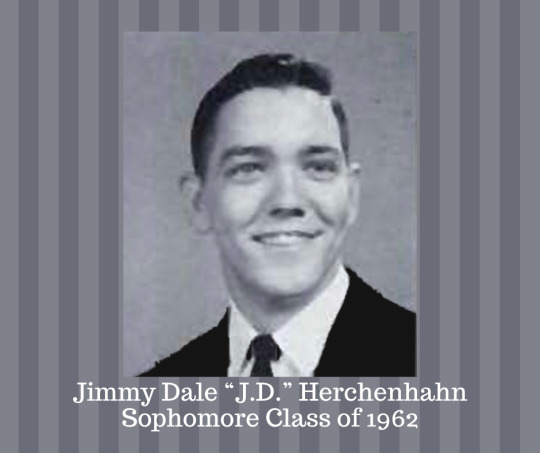
Jimmy Dale “J.D.” Herchenhahn entered into the presence of his Lord and Savior whom he so earnestly loved and served Thursday morning May 11, 2023 at the Lower Cape Fear Hospice LifeCare Center. Some people called him Dr. Herchenhahn, many others knew him as Pastor, but to us he was forever our precious Dad and Papa. His faith has become sight, and we believe he heard a big “Well done, good and faithful servant” when he entered heaven’s gates!
He was preceded in death by his beloved wife of over 54 years, Jean Herchenhahn; his parents, A.B. and Iva Herchenhahn, two brothers, Allen Herchenhahn and Fred Herchenhahn; and five sisters, Lucille Jones, Jean Brunson, Gayle Mattheiss, Dawn Gunderson, and Louise Bates.
Jim loved his family dearly and will be most missed by his three children, Janna (Jeff) Attoe of Hampstead, Jay (Gina) Herchenhahn of Lancaster, SC, and Joy (Brad) Barth of Kernersville, NC; grandchildren Jensen (Ray) Rivera, Jonah Attoe, Jayse Attoe, Kalli Herchenhahn, Kassi Herchenhahn, Khloe Herchenhahn, Caleb Herchenhahn, Cooper Barth, Colton Barth, and Copley Barth; great-grandchildren, Vincent and Halston Rivera; two sisters, Wilma Jones and Judy Ray; many nieces and nephews. Janna, Jay and Joy would like to thank Steve and Joanna Groves, David Groves, and Tom Hayden for faithfully and lovingly caring for our dad. We would also like to acknowledge and thank David and Cathy Lane, Edna Lancaster, Mark and Nancy Cramer, and Jimmy Sibbett for loving our dad and being the hands and feet of Jesus in dads time of need.
Jimmy Dale was born April 25, 1941 in Macedonia, Mississippi. During his junior year of high school in Pensacola, Florida, he received Christ as his Savior under the ministry of Dr. Dolphus Price. As a senior, he surrendered to preach the Gospel. He attended Bob Jones University in Greenville, South Carolina before serving two years with the United States Army. He was a Vietnam Veteran.
Jim finished his college education at Tennessee Temple College in Chattanooga, Tennessee. He was involved in many aspects of college life including playing on the baseball team and serving as student body President. It was there that he met and married his sweetheart. He received his bachelor’s degree in 1968. He pastored the Fellowship Baptist Church in Trion, Georgia for three and a half years during his tenure at TTC and afterwards. Then in 1970, the Lord called the Herchenhahns to Wilmington to work at Grace Baptist Church—first as Assistant Pastor under Dr. Ray Noland, and then starting in 1971 as Senior Pastor of Grace and President of Wilmington Christian Academy.
The Lord used Pastor Herchenhahn in a great way during his thirty-six years in leadership of the church and school. Hundreds of people came to know the Lord under his ministry, and many others grew in their faith. A number of men and women were called to various areas of “full-time Christian service” under his leadership. Many missionaries, pastors, teachers, and others are still serving the Lord around the world.
He retired from Grace at the end of December 2006. That freed them up to do some short-term mission work in Guam. After that he began filling pulpits for preachers in and around the Wilmington area. That ministry led them to Riley’s Creek Baptist Church in 2010, where he was called to be their Senior Pastor. He retired from Riley’s Creek in 2021 for the primary purpose of taking care of his beloved wife and soulmate who was declining in health. He wanted to spend as much time with her as he possibly could, and that he did.
Only eternity will reveal the impact of the life and ministry of Pastor J.D. Herchenhahn. He was an exemplary pastor, faithfully preaching the Word and sharing the gospel, as well as humbly serving and caring for people. He often quoted these lines from a poem: “Others, Lord, yes, others, let this my motto be, “help me to live for others, that I may live like Thee.” He certainly reflected Jesus through his life.
The family will receive friends for visitation from 11:00 a.m. to 2:00 p.m. on Saturday, May 13, 2023 at Grace Baptist Church, 1401 North College Road, Wilmington, with a memorial service honoring Pastor Herchenhahn will be immediately following. Close family friend and co-laborer Rev. Mike Meshaw will officiate along with Rev. David Lancaster and Rev. Jay Knolls.. There will be a graveside service at 1:00 p.m. on Tuesday, May 16, 2023 at Oleander Memorial Gardens. with Rev. Brian Beaver conducting the service.
In lieu of flowers memorials may be made to Lower Cape Fear LifeCare Foundation, 1414 Physicians Dr., Wilmington, NC 28401. We will be forever grateful for their gentle care and compassion given to our dad.
Online condolences may be made by selecting Tribute Wall.
#Bob Jones University#BJU Hall of Fame#2023#Obituary#BJU Alumni Association#Jimmy Dale “J.D.” Herchenhahn#Class of 1962
2 notes
·
View notes
Text
Meditation
“In him we have redemption through his blood, the forgiveness of our trespasses, according to the riches of his grace, which he lavished upon us, in all wisdom and insight making known to us the mystery of his will, according to his purpose, which he set forth in Christ as a plan for the fullness of time, to unite all things in him, things in heaven and things on earth.
And what is the immeasurable greatness of his power toward us who believe, according to the working of his great might far above all rule and authority and power and dominion, and above every name that is named, not only in this age but also in the one to come.
And he put all things under his feet and gave him as head over all things to the church, which is his body, the fullness of him who fills all in all.”
Ephesians 1:7-10, 19, 21-23
Reflection
The Cross was always the plan. Lift Him Up! Lift my Savior up. Still He speaks from eternity. If I be lifted up from the earth, I’ll draw all men unto me!
“It's Friday:
The spiritual leaders are locked in, and committed to do evil, by killing True Religion, “Having Faith in God,”for money, position, and the soul bondage over men. They must kill The Word made flesh, “Have Faith In God!” Who points everyone to having a relationship with God!
On Friday:
Plotting to kill Yashuah, Judas takes Satan Religion, The Spirit if deception, and “gets paid” to trade The King of kings, and Lord of lords, Faith and Love, for 30 pieces of silver. The Spirit of deception, counterfeit anointing, is loosed through a friend, in His church, and it spreads.
That Friday:
People, so many Yashuah healed, others He delivered, turned in Him, accused Him, demanded He be crucified. That Spirit of deception was loosed. It impacts His closest friends, family, followers, and they abandon faith and love, unable to stand with Yashuah. Apostasy is loosed everywhere.
During that Friday:
Judas betrays Him. Soldiers take Him. Later mock, beat, hang, crown Him, later to pierce Him.
Peter denies Him. The rest of His church and followers scatter, and abandon Him.
Rulers, leaders, institutions ridicule, sentence, mock, judge, and have Him, nailed and lifted up! BUT: The Cross was always the plan!
Good Friday:
That Thing that makes it Good: It ain’t over until it’s over. Right before He dies, He had to live, love, forgive, receive one into paradise, and die, so we could be born again.
Yashuah, He becomes that “Well done good and faithful” witness!
He inaugurates “It is finished!”
He releases “The Holy Spirit.”
Friday’s Plan:
Beatings: Mental, emotional, physical, etc. The Splintered tree - The Cross. Nails. The Veil of The Temple. The Blood. The Spirit of Christ to triumph over any of the spirits of apostasy, Jezebel, Delilah, disobedience, lies, church hurt, selfishness, self-righteousness, abandonment, greed, false worship, temple pimping, satan, and deception.
HOW? When Christ, at last, breathes “It is Finished!” He conquers ALL for those who believe.
Yashuah continues to conquer today through our confession of faith and lifestyle of Love. His blood 🩸 🩸🩸🩸! No matter what weapon formed against you, prevails.
Look to The Cross! It’ll become a Good Friday, whether on a Sunday, Monday, weekday! It will become a “It is finished” day!
The Blood 🩸 🩸🩸🩸of Yashuah “Made it possible!” Now, can you see why The Cross was needed? “He put all things under his feet and gave him as head over all things to the church, which is his body, the fullness of him who fills all in all.”
1 note
·
View note
Text
United in Devotion: Join Us for the 2025 HJ Cosmic Blessing
February 21, 2025
United in Devotion: Preparing for the 2025 HJ Cosmic Blessing and Entrance Ceremony
Dear Brothers and Sisters,
As we continue our three key campaigns to offer a victorious offering from America for the Entrance Ceremony of the Cheon Won Gung Cheon Il Sanctum, we are deeply aware of the special devotions our True Mother is making for the success of the 2025 HJ Cosmic Blessing and the Entrance Ceremony.
With America actively attending True Mother, we have been working together in heart and action to welcome newly Blessed couples and witness the historic moment of our Heavenly Parent entering the eternal temple. Your dedication—through witnessing, supporting our young people, and contributing to the Cheon Won Gung—is truly inspiring. Thank you!
As we approach the final stretch, particularly with the upcoming deadline for Blessing registrations, we invite everyone to join in a special period of devotion from now until March 21 for the purpose of supporting our young members to be matched and registered for the blessing in time for this year. Let us focus our prayers on these key points:
Supporting True Mother’s vision for the victorious offering of the 2025 HJ Cosmic Blessing and Entrance Ceremony.
Securing victory for the Blessing initiative, bringing our young couples to Korea for the cosmic blessing.
Ensuring all members participate in the special grace including all couples who can renew or even restore their standing as blessed families without blemish in preparation for the Entrance Ceremony.
Strengthening our unity and commitment as the Elder Son Nation, fulfilling our responsibility to attend and support True Mother, our Holy Mother Han.
Now is the time to offer our utmost sincerity, faith, and devotion. Let us stand together, unwavering in our love and commitment, as we support True Mother in ushering in this new era.
Thank you for your prayers, efforts, and investment in Heaven’s providence.
In gratitude and unity,
0 notes
Text
A poetic look:
For we are the product of His hand, heaven’s poetry etched on lives, created in the Anointed, Jesus, to accomplish the good works God arranged long ago.
Today’s reading of the Scriptures from the New Testament is the 2nd chapter of the letter of Ephesians:
As for you, don’t you remember how you used to just exist? Corpses, dead in life, buried by transgressions, wandering the course of this perverse world. You were the offspring of the prince of the power of air—oh, how he owned you, just as he still controls those living in disobedience. I’m not talking about the outsiders alone; we were all guilty of falling headlong for the persuasive passions of this world; we all have had our fill of indulging the flesh and mind, obeying impulses to follow perverse thoughts motivated by dark powers. As a result, our natural inclinations led us to be children of wrath, just like the rest of humankind.
But God, with the unfathomable richness of His love and mercy focused on us, united us with the Anointed One and infused our lifeless souls with life—even though we were buried under mountains of sin—and saved us by His grace. He raised us up with Him and seated us in the heavenly realms with our beloved Jesus the Anointed, the Liberating King. He did this for a reason: so that for all eternity we will stand as a living testimony to the incredible riches of His grace and kindness that He freely gives to us by uniting us with Jesus the Anointed. For it’s by God’s grace that you have been saved. You receive it through faith. It was not our plan or our effort. It is God’s gift, pure and simple. You didn’t earn it, not one of us did, so don’t go around bragging that you must have done something amazing. For we are the product of His hand, heaven’s poetry etched on lives, created in the Anointed, Jesus, to accomplish the good works God arranged long ago.
So never forget how you used to be. Those of you born as outsiders to Israel were outcasts, branded “the uncircumcised” by those who bore the sign of the covenant in their flesh, a sign made with human hands. You had absolutely no connection to the Anointed; you were strangers, separated from God’s people. You were aliens to the covenant they had with God; you were hopelessly stranded without God in a fractured world. But now, because of Jesus the Anointed and His sacrifice, all of that has changed. God gathered you who were so far away and brought you near to Him by the royal blood of the Anointed, our Liberating King.
He is the embodiment of our peace, sent once and for all to take down the great barrier of hatred and hostility that has divided us so that we can be one. He offered His body on the sacrificial altar to bring an end to the law’s ordinances and dictations that separated Jews from the outside nations. His desire was to create in His body one new humanity from the two opposing groups, thus creating peace. Effectively the cross becomes God’s means to kill off the hostility once and for all so that He is able to reconcile them both to God in this one new body.
The Great Preacher of peace and love came for you, and His voice found those of you who were near and those who were far away. By Him both have access to the Father in one Spirit. And so you are no longer called outcasts and wanderers but citizens with God’s people, members of God’s holy family, and residents of His household. You are being built on a solid foundation: the message of the prophets and the voices of God’s chosen emissaries with Jesus, the Anointed Himself, the precious cornerstone. The building is joined together stone by stone—all of us chosen and sealed in Him, rising up to become a holy temple in the Lord. In Him you are being built together, creating a sacred dwelling place among you where God can live in the Spirit.
The Letter of Ephesians, Chapter 2 (The Voice)
A note from The Voice Translation:
The relationship between faith and works is often misunderstood. Some think that salvation is God’s reward for good deeds. If that’s true, then it can’t possibly be a gift. If it were a reward, then heaven would be a place where people might compare notes on what they did to make it through the gates. But Paul is confident in the truth of the gospel. The truth is that salvation is God’s gift through Jesus. Grace and faith make salvation real in us. When we are transformed by grace, then we become His new creation and begin to live out the good works He has planned for us. Works, then, aren’t the cause of salvation; they are its result. To put it another way, works aren’t the means of salvation; they are its presence.
Today’s paired reading from the First Testament is the 24th chapter of the book of Leviticus:
The Eternal One spoke to Moses.
Eternal One: Direct the Israelites to bring you clear oil from pressed olives in order to keep the lamps in the sanctuary outside the veil covering the covenant chest continually burning. Aaron is to make sure the lamps continue to burn in My presence from dusk till dawn. This directive stands for all time throughout your generations. On a regular basis, Aaron and the priests are to tend to the lamps on the pure gold lampstand before Me.
I want you to take the finest flour and bake 12 loaves of bread. Each loaf is to be made of four quarts of flour. Then arrange the 12 loaves into two rows on the pure gold table in My presence. Put six loaves in each row. Place pure frankincense along each row to serve as a memorial portion for the bread, as a fire-offering to Me. Every Sabbath Aaron is to make sure these rows of bread are in order before Me. These loaves, baked and presented by the people of Israel, symbolize the perpetual covenant. They are reserved for Aaron and his sons, but they must be eaten only in a sacred space. These loaves are most holy gifts to Aaron out of all the fire-offerings presented to Me; they are his due for all time.
One day there was a man who had an Israelite mother and Egyptian father who got into a fight with an Israelite inside the camp. The first man uttered a curse and disparaged the name of the Eternal One. The people brought him to Moses to decide what must be done. (His mother was Shelomith, Dibri’s daughter. Dibri was from the Dan tribe.) They kept him in custody until the Eternal One’s decision became clear to them.
The Eternal One told Moses what to do.
Eternal One: Take the man who cursed and disparaged Me outside the camp and have everyone who was a witness to what he said place their hands on his head. Then have the entire community stone him. Tell the Israelites, “Anyone who curses His God or disparages His name must bear his sin and suffer the punishment. Any person who blasphemes My name must be put to death. Then you must have the entire community join in stoning him. Any person—whether native-born or an outsider—who disparages My name must be put to death.”
Anyone who kills another person must be put to death. Anyone who kills an animal is to compensate his owner for it, life for life. Anyone who injures his neighbor must have done to him what he did to the other. If he breaks a man’s bone, his own bone must be broken. If he puts out a man’s eye, his own eye must be put out. If he knocks out a man’s tooth, his own tooth must be knocked out. Whatever a person does to harm another must be done to him in return. Any person who takes the life of an animal is to compensate his owner for it, but any person who takes the life of another human being must be put to death. This law applies to everyone equally, both native-born Israelites and outsiders. I am the Eternal One, your God.
Moses told the Israelites what God had decided, so they took the man who had uttered the curse outside the camp and stoned him. The Israelites did exactly as the Eternal One had instructed Moses.
The Book of Leviticus, Chapter 24 (The Voice)
A note from The Voice Translation:
The “law of retaliation,” as it is called, is designed to curb cruelty. It limits the kind and extent of retaliation a person can suffer when he deliberately injures another.
A link to my personal reading of the Scriptures for monday, june 24 of 2024 with a paired chapter from each Testament (the First & the New Covenant) of the Bible along with Today’s Proverbs and Psalms
A post by John Parsons:
“And now abide faith, hope, love: these three” (1 Cor. 13:13). The opposite of faith is fear; of hope, despair; and of love, indifference. Fear is the “default mode” of the soul that dwells in darkness. This is because the “fallen” soul regards the empirical world and its flux as ultimately real -- and therefore “sees in order to believe.” The life of faith, on the other hand, looks beyond the realm of transient appearance to behold an abiding glory -- and therefore “believes in order to see.” How we choose to see is ultimately a spiritual decision for which we are each responsible....
In the geo-political world there are more seemingly good reasons to be afraid today than in any time since the rise of Nazi Germany in the 1930s. Every day the media indoctrinates people about the threats of various plagues (e.g., H5N1, H1N1, SARS, Covid), of economic disasters, of terrorist plots, and so on. In short, living within a “culture of fear” (with its ongoing propaganda campaigns from both the right and left wing perspectives) is to traffic in images and sound bites, inducing a sense of dread and anxiety (as someone once said, “FEAR” is "False Education Appearing Real"). Just as a lie-detector can physiologically sense when people are telling lies, so our souls can sense when we are believing them... There is no neutral ground here, no “transcendent” place of the soul where we can rise above the realm of truth claims: We will either be set free by the truth or else we will live in fear. As Yeshua said, the “Truth shall set you free” (האמת תשחרר אותך).
Of course it isn’t easy to be courageous, and the temptation to yield to fear often seems compelling. The test of our faith is of more value to the LORD than our material or emotional comfort, however, and therefore we will all experience tribulation of various kinds. This is the way we obtain heart (i.e., courage). Awhile ago I wrote a Hebrew meditation (“Fear Thou Not”) that reminded us that the most frequently occurring commandment in Scripture is simply al tirah (אַל־תִּירָא), “don’t be afraid.” If living without fear were easy, it would be of little spiritual worth, but since it requires all of our heart, soul, mind, and strength, it is therefore considered precious. It requires, in short, an infinite (and divinely given) passion. And it is part of God’s plan for us to be “in but not of” the world system, to be alienated, to be misunderstood, to be persecuted... We are called to “take up the cross” and to die daily. Following Yeshua means denying ourselves along the way.
Ultimately fear distills down to the fear of death, or rather, of “the one who has the power of death, namely the devil” (Heb. 2:14-15). If we come to peace with our own finitude, our own mortality, and our eventual blessed estate in the Messiah, death has no more power over us. Perhaps this is part of the reason why Christian faith is so hated in communist countries or in other places of absolutist secular ideologies (including “deconstructed” America). If you are free from the greatest threat that man can menace over you, if you are free of the fear of man, then you are free to be a voice crying in the wilderness, a bold witness of the of truth....
Fear is the antithesis of faith, though living without fear is certainly not easy. After all, how do we naturally choose to be unafraid of what we in fact fear? Is this power within our conscious control? Only by a miracle are we set free from fear... Indeed, true faith working within the heart is one of the greatest miracles of God. May it please God to impart to each us real courage that comes from Heaven itself. Amen.
Shabbat shalom and thank you for remembering me in your prayers... I really need them! - John
[ Hebrew for Christians ]
========
1 John 4:18 reading:
https://hebrew4christians.com/Blessings/Blessing_Cards/1john4-18a-jjp.mp3
Hebrew page:
https://hebrew4christians.com/Blessings/Blessing_Cards/1john4-18a-lesson.pdf

6.22.24 • Facebook
from yesterday’s email by Israel365
Today’s message (Days of Praise) from the Institute for Creation Research
0 notes
Text
Mandir For Marriage- What Spiritual Factors To Keep In Mind?
“ युवयोः वैवाहिकजीवने सर्वदा शुभं भवतु। ”
“May your marriage life be happy”
Marriage is a celebration of love, a timeless force that unites two souls under the blessings of divine beings. Despite the modern shift towards registered marriages, a Hindu wedding finds its true essence in sacred rituals like the saat pheras. Beyond paperwork, these rituals embody the essence of a sacred union. If you seek to fortify the bond between two souls and families through sacred wedding mantras, the welcoming doors of Shri Gauri Shankar Mandir in Brampton for your marriage await you.
We all desire a wedding day filled with joy and significance. Finding the right mandir for your marriage can be a bit challenging, especially in a foreign land. In today’s blog, let's guide you on what factors to keep in mind when opting for mandir for marriage.
What sets mandir for marriage apart and makes them special?
A mandir for marriage offers numerous advantages, enveloping the ceremony in the simplicity of Sanatan Dharma principles and instilling sacredness into the lives of the newlyweds. Commencing a new phase of life in alignment with divine laws is a unique blessing, reserved for the fortunate few.
The mandir, as the abode of the spiritual supreme being, exudes a calm and mystical aura, providing an ideal commencement for this exciting and sacred journey. Especially when away from the homeland, a marriage in mandir becomes the perfect set to unite the entire community in holy communion, and foster a sense of togetherness and shared spirituality.
Elevate Your Mandir for Marriage Experience: Ten Spiritual Factors to Consider
Step into a sacred journey where we explore the essential spiritual aspects of a temple wedding.
Positive vibes to blending a tradition into modernity, each element adds a special touch to create your marriage filled with blessings and eternal love.
1. Harness Positive Energies:
Within the sanctum of a Mandir, the energies are purified and charged with positive vibrations. Your marital vows resonate in an environment that fosters spiritual harmony, setting the stage for a journey filled with love, understanding, and shared growth. The Mandir becomes a reservoir of good energy, ensuring a positive start to your life together.
2. Astrological Considerations:
Delve into the cosmic side of marriage by incorporating astrological elements. Consult an astrologer to align your wedding date and time with favourable celestial configurations. This not only adds a celestial touch to your union but also ensures that the cosmic energies are working in your favour.
3. Customization for Spiritual Aesthetics:
Transforming a Mandir into a personalized haven involves more than just floral arrangements. Consider incorporating spiritual symbols, colours, and rituals that hold personal significance. This customization ensures that every aspect of your wedding is a reflection of your shared spiritual journey.
4. Seeking Blessings from Deities:
A Mandir for marriage is a conduit to divine blessings. Engage in rituals that seek the blessings of specific deities associated with love, harmony, and marital bliss. This not only adds a spiritual layer to your wedding but also establishes a connection with timeless traditions.
5. Saat Pheras and Ritual Spaces:
Ensure that the mandir provides dedicated spaces for essential marriage rituals, including the saat pheras. A well-organized ritual area contributes to the authenticity and spiritual essence of the ceremony.
6. Balancing Tradition and Modernity:
In the quest for spiritual depth, find the delicate balance between traditional rituals and modern sensibilities. Merge the timeless beauty of sacred ceremonies with the practical aspects of a contemporary wedding, creating an experience that resonates with both the past and the present.
7. The Power of Intention:
Infuse your marriage ceremony with the power of intention. Speak your vows with clarity and conviction, understanding the profound commitment you are making. This mindful approach transforms the ritual into a powerful act of creating the future you envision together.
8. Embrace Unity in Diversity:
A Mandir for Marriage is a canvas where diverse spiritual beliefs can coalesce. Embrace the richness of different traditions, creating a ceremony that respects and honours the spiritual backgrounds of both partners. This inclusivity adds depth and authenticity to your union.
9. Incorporating Mindfulness Practices:
Elevate your wedding experience by incorporating mindfulness practices. Whether it's a moment of silent meditation or a guided mindfulness exercise, these practices create a serene atmosphere, allowing you to savour each moment and cultivate a deeper connection with your partner.
10. Beyond the Wedding Day:
The spiritual journey doesn't end with the wedding ceremony—it's a lifelong commitment. Continuously nurture the spiritual aspects of your relationship by engaging in shared practices, be it prayer, meditation, or acts of kindness. The Mandir becomes a metaphor for the ongoing sacredness of your union.
The Divine Aura– Reasons to Choose Shri Gauri Shankar Mandir for Marriage
As you stand at the threshold of matrimony, let the spiritual factors guide your choices. Shri Gauri Shankar Mandir is a timeless testament to spiritual sanctity and embarks on this journey with a profound connection to the divine. In the sacred hold of this mandir, your marriage becomes not just a union of two souls, but a celestial symphony, harmonizing your spirits in the divine dance of love.
Choose the sacred radiance of Shri Gauri Shankar Mandir and let your marital bliss be adorned with the blessings of the divine.
The article was originally posted on: Mandir For Marriage- What Spiritual Factors To Keep In Mind?
0 notes
Text
Slow Burn - Prologue

Part I | masterlist
A/N: This is a “must read” precursor to the whole series. Please read it to know what the origin story is.
Pairing: Y/N x Obi Wan Kenobi
Words: 2048
Warnings: None. Brief mentions of violence. Low self esteem.
I am always one to experience emotions at a heightened frequency. Dangerous for a Jedi in training I know, but the council never took it as a sign of caution, just a minor set back. Happiness is bright, and beaming, even painful. My cheeks hurt for days after, smile lines sculpting my skin too early in life. Anger is powerful, my skin becoming vicious, and hot. Ripping through me like a silver bullet, and tearing my already unrelenting gut apart. I am loud, I am violent, and most of all, passionate. I would later become grateful of this curse, turning it into a blessing. Sadness is so deep. Tears crash like an ocean, and my heart would ache in my chest. The physical symptoms of my despair become overwhelming, and make me sick.
A fresh eighteen myself, my graduation is only a year or so away. Compared to other padawans, ones that don’t deal with the same struggles as myself, have already been graced with knighthood. They make their masters proud, and have already completed more missions at sixteen than I think I ever will in my entire career.
I had the choice to become independent, to take my morals by the throat, and shove them deep down inside me, never to be seen again- but it really just isn’t that easy. See, I’m taking this time for meditation, or even a “behavioral therapy” of sorts. I have meetings with other council members, more powerful, and more prominent than my own master, who is often off tending to matters elsewhere. A mighty general he is, but they see me as someone who would cause more of a distraction, so I stay here at the temple left to my own devices. Sometimes I think it may be because I’m a woman, and other times I just take a good look in the mirror and recall the outburst that has stained my face only minutes before.
Today was like any other; wake up, meditate, exercise, study, combat training, study, try and find time to eat something, and study. I walked down the main hallway with Master Yoda. He spoke to me about how he once struggled with his emotions as well, but with enough meditation, learned how to keep them at bay. Looking down at him and his vacant expression, I was surprised he had ever even felt an emotion a day in his life. That was until seconds later…
Stopping in my tracks, my hand flew over my heart. I recalled feeling out of breath, like my heart had physically stopped beating in my chest, or at least was trying to catch up with the rest of my body. I was shaky, yet somehow managed to take a knee. Something was off, that feeling in my chest grew and grew until I was faced with the blackest black I had ever felt. The darkest emotion to ever run through my body, as cold as ice, and heart stopping. It was deep, I felt it within the darkest abyss in my soul. It wrapped around my insides and nestled itself a home deep within the most shielded corners of my subconscious. That’s when Master Yoda felt it too. His hand flying over his heart, and steadying himself on my own shoulder. His face morphed into a snarl, gasping at the sudden pain that now infected his unwavering calm aura.
...
After a painstakingly slow recovery, I sat on the edge of my bed. My quarters were neat and tidy. My bed, usually made up in the morning, because I have always been one for a routine. My walls weren’t bare, in fact they were almost completely covered in photographs I have taken from my travels as a Padawan. I'd go to the library, and butcher borrowed books, clipping photos of different words, and alien fauna. But today, those bright colors capable of producing fantasies for hours and hours, seemed black and white.
I had been staring at the floor for sometime, desperate in trying to heal the ache in my chest. It felt as if I had a cold, like the burn after a deep cough. I felt so tight, so tense, an actual living embodiment of rigor mortis. Yet, at the same time, I hardly felt all there. It was as if my existence was floating all around me, and my shell was sitting vacant on an uncomfortable mattress. The knock on my door was enough for me to engulf myself again.
“Y/N, are you decent?” The voice asks.
“Yes,” I reply, rolling my shoulders back.
“The council has requested an audience. Please report downstairs within the next few minutes.”
I nod my head, as if whoever was behind the door could see me.
“An audience,” I think. “Let’s add another year to that training plan, shall we?”
...
Walking downstairs to the council room, I can’t help but feel that all eyes are on me. They cut through me like a hot knife, slicing me thin. I feel so vulnerable. Like everyone around me can feel what I feel, and if I’m being honest, they probably do. A good Jedi who is in tune with the force, and especially in tune with others, can sense an intense emotion from a mile away. I’m sure at this moment I pretty much equate to an open book. No reason to try and hide it, force knows I struggle with concealing even an inkling of agitation.
Seeing the council room in sight, I take a deep breath. This is it. I’m done for. This reaction was way too over the top. I’ve scared people, I’ve scared Master Yoda. Might as well just turn in my saber now and call it a day.
I walk into the door. Only a few masters sit scattered around. Master Yoda of course perched dead center, Master Windu waiting patiently to his right. But my master was nowhere in sight. You’d think if they were going to terminate me, that maybe my own mentor would be among them? Shaking his head, sending me glares that one could only compare to fucking daggers. He was tough on me for sure, maybe he was too ashamed of what I’d done to even bear to see me in this moment.
“Coming here so quickly you did,” Starts Master Yoda. “Grateful we all are.”
I smile and bow my head.
“Y/N,” Master Windu starts. “We’re here to discuss the events that happened earlier.”
Oh god here it comes. This is it. I’m totally done for. I can’t even keep myself calm now. My face, getting hotter and more red by the second, is going to be the biggest tell. At least let me go out with some dignity.
“Your reaction, what you felt at least, was not just brought on out of the blue. Master Yoda had the same experience, as did all of us on the council, and most Jedi and padawans in the temple.”
“I don’t understand.” I say.
“At around 1 Coruscant time, an enemy bomb was detonated on Nal Hutta.”
Then it hit me. My heart sinking, I began to shake my head.
“Unfortunately, Unit 505, and Master Cato were all killed on impact.”
My ears ring. Slowly, I move over to a chair, bracing myself.
“That’s,” I start, trying to find the words to say. “He would’ve felt it, all of them would, I don’t understand.”
“We have a feeling it was planted by a Sith. That’s the only way it would’ve clouded any judgement.”
I slump into it, my vision going black, my head spinning.
Master Cato has been with me since I was a very little girl. Although rough, tough, and brutally honest, he has done nothing but be a father to me time and time again. Everything I do is a reflection of him. He had been so busy at war, fighting day in and day out, I caught myself missing the commands, and demands I once so passionately despised. I took our whole relationship for granted, and now, is this the price I have to pay? The last time we spoke he told me how disappointed he was in my outburst in my Alien Fauna lab. I was being stubborn, I was bratty, and rolled my eyes. We had argued that entire call. He didn’t even attempt to say goodbye. Now, for an eternity, I will have to face the catastrophic guilt of my actions. Live with the fact that I never, ever told him how much I appreciated him. And even, how much I loved him so. The closest thing to family in my life, gone, in the snap of a finger.
Both Master Yoda and Master Windu continued to talk but it all felt like empty words. I couldn’t hear them anyway.
“Although this situation isn't ideal, we and the rest of the council applaud you for being able to feel something most of us haven’t been able to experience yet.” Claimed Master Windu.
I don’t listen. I stand up again.
“What am I going to do? I don’t feel comfortable with being knighted yet. I had- we were working on so many things I-,” I stumbled on my words.
“You’ll get placed with a new master.”
“There are no new masters. And even if I had been trained a certain way, I don’t know how to learn otherwise.”
There is silence.
“The force works in mysterious ways. Meant to happen, I feel.”
I scoff. “Meant to happen,” what an evil thing to say.
I begin to walk off, stopping of course, only to get in the last word.
“Not only have you told me that my master has been killed, but you lack any empathy. There is no emotion in your eyes. Nothing.”
“We mourn your master y/n, just as much as you do. You know what we stand for. You know our view on attachments.”
“He's like-,” I choke. “He was like my father.”
I can’t even begin to explain the pain I feel. Disgust in myself, I should’ve been better. I could’ve been better. The last few years of our relationship I’ve just been behaving poorly and rebelling, and then getting angry at him when he made me face the consequences. Like I wasn’t aware of the job I was made to do. I should’ve been nicer, I could’ve been nicer. It’s all going in a circle, all the things I should’ve done just morphed into things I couldn’t do. Maybe I was too emotional. Maybe my tears that fell leading up to this moment was all part of the plan, the final kicker to show that I wasn’t apathetic enough for this job. My empathy, my burning passion will always be my biggest flaw. This hole that gapes inside of me will never be filled, and now it grows bigger. It’s like a disease. Am I enough? Will I ever be enough?
“Put you with Master Kenobi, we will.” States Master Yoda.
Master Windu is quick in turning his head. He glares at him.
“Master Yoda, General Kenobi has just finished his training with Anakin. It is far too early to give him a new Padawan, if at all.”
Yoda nods, almost giggling.
“Yet so freshly knighted, a Padawan Anakin already has. Obi Wan will have no problem with taking on a student. Graduates soon, she will.”
“But General Kenobi and I have two completely different methods of combat, let alone ideals.” I scoff.
“All Jedi have the same ideals.” Adds Windu.
“He is a Jedi guardian, I am a Jedi sentinel-“
“Train with General Kenobi you will. Not long ago he also lost his master too soon.”
Master Yoda nods to me. He stands up and walks over to the large windows behind him. Looking out over Coruscant, he takes a deep sigh of relief.
“Master Windu,” says Yoda. “Get in contact with the 212th battalion.”
I watch on as my fate now rests in a stranger's hands.
#obi wan kenobi#obi wan kenobi smut#obi wan kenobi x you#obi wan kenobi x reader#obi wan fic#anakin skywalker#anakin x obi wan#ahsoka tano#star wars#star wars smut
50 notes
·
View notes
Link
Excerpts from the above article:
The Grimaldi Goddess clay figurine, unearthed at the Neolithic settlement of Çatal Hüyük in Turkey, dates back to about 6000 BC. It depicts an obese woman giving birth while seated upon a throne. Although many have considered this a sure sign of feminine fertility, many scholars have dismissed the two massive dog-like beasts sitting by her side. The focus has continued being about sexual reproduction symbols, rather than her role in dog domestication and dominance over woman’s best and most loyal friend.
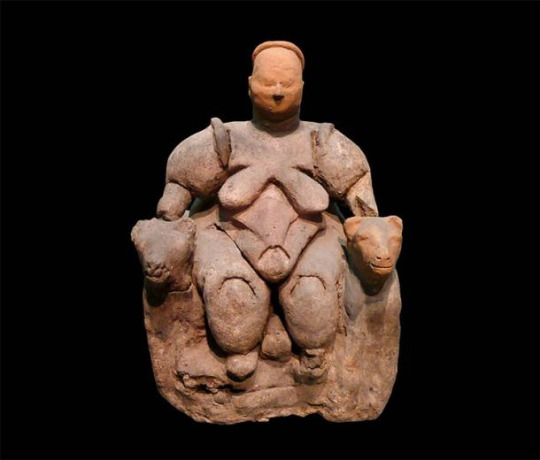
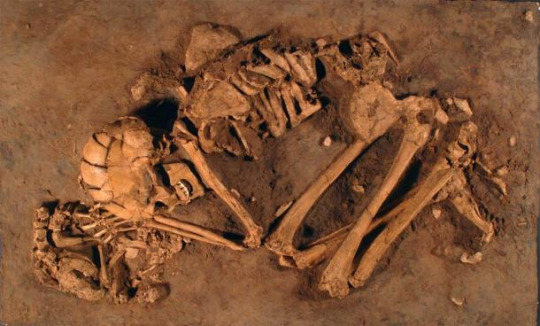
In northern Israel, archaeologists discovered the remains of a 12,000-year-old Natufian woman with her hand resting on a pet puppy, at the ‘Ain Mallaha site. This is one of the first known remains related to dog domestication. (The Israel Museum, Jerusalem )
At an excavation site near Lake Baikal in Siberia, the archaeologist and geneticist Andrea Waters Rist from Leiden University discovered two 8,000-year-old skeletal remains of Neolithic Siberian women carrying signs of the parasitic infection known as echinococcosis. This disease occurs when humans have long interaction and contact with canines through the sharing of food, water, and in some instances from being exposed to canine fecal matter. Waters-Rist’s analysis concludes that ancient Siberian women of this forgotten tribe might have been responsible for the caring, feeding, and rearing of dogs. Within every culture, there is distinct evidence that women were significant to the rearing and training of dogs. Shortly after the domestication of the dog, humans lived side by side with these animals, considered them equals, and depended on them for protection and assistance in their everyday lives. According to scholars such as Waters-Rist, it is therefore not surprising that humans would also endure the same sicknesses as well. As time went on, dogs were reared by both men and women, and they eventually became part of the family unit across many cultures. Without the friendship and alliance of dogs, there would be no human civilization. This fact must have been well understood in the ancient world, as there are several goddesses associated with dogs. Could these dog-friendly deities provide clues to the relationship between women and dogs?
Dog-Friendly Deities: Women and Dogs in Mythology
Aside from the Grimaldi Goddess figurine hypothesis previously mentioned, the list of gods who demonstrate a strong relationship with dogs include the goddess Gula, also known as Bau, Nintinugga, and Basat, who was often represented sitting near dogs. The goddess of dogs and healing, in her earliest form she was described as the dogs' controller, but she became associated with spells and healing in later years. Her temples were prevalent in Mesopotamia, Babylonia and Sumer, and stray dogs were allowed to roam within their walls. Altars at her temples were littered with dog statues, dedicated to her in the hope she would provide speedy recovery for loved ones. Her sacred symbol remained that of the dog until she was forgotten over time.
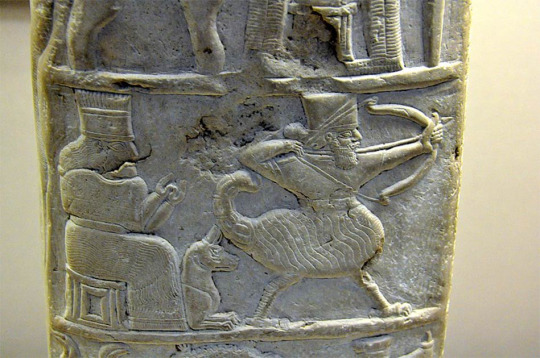

Left; Detail of the goddess Nintinugga, her dog, and a scorpion man from kudurru of Nebuchadnezzar granting Šitti-Marduk freedom from taxation. British Museum. ( CC BY-SA 4.0 ). Right Public Domain )
Other powerful mythical deities and goddesses were associated with hunting. The goddess Atalanta was often painted equipped with a bow, spear, and dogs, not to mention a severed boar head, representing luck with the hunt and fruitful prosperity. As the scholar Adrienne Mayor has mentioned, vase paintings depicted Amazon archers accompanied by dogs as they ran to battle or hunted. The eternal bond between women and dogs, especially on Greek vases, is evidence of an unbreakable connection. The goddess Artemis (Diana) is another deity which illustrates the connection between women, hunting and a feminine command over dogs, wolves, and animals. Another Greek goddess was Hecate, who was responsible for crossroads and entryways, as well as dogs. However, her depiction was far more sinister, as she represented the unpredictability of magic and spells. She was a shapeshifter, described as having three heads and was often responsible for dog barking, since they were obliged to announce her entrance anywhere she went.
Amongst the ancient Greeks, there are a few common themes related to women and dogs, in that their companionship was seen as old and mysterious, but beneficial for all. Much ancient Greek art portrays men hunting with hounds, but the representation of warrior women and ancient hunting deities could help shine a light on a past when women trained dogs for hunting and gathering.
There is not much evidence to speak for this hypothesis, besides some Greco-Roman art and a few Scythian warrior women gravesites with hounds. There is however significant evidence of women rearing and training dogs for the purpose of assisting in hunting and carrying supplies. The most extraordinary evidence can be seen with the ethnographic accounts of early North American Plains Indians as they spoke of the time before the arrival of Spanish horses.
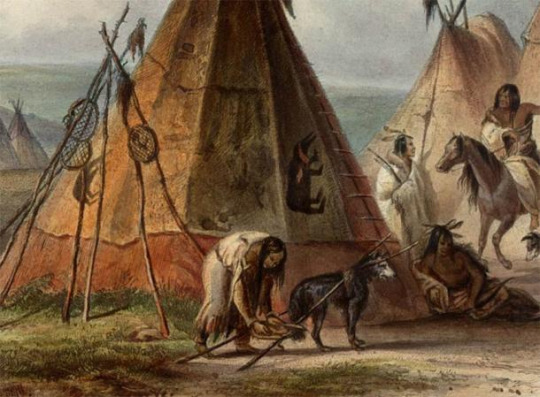
Detail from a Karl Bodmer painting showing a dog with a travois in an Assiniboine camp in the Great Plains. ( Public domain )
Women and Dogs in North American Plains Indian Culture
The most famous account is from the Hidatsa elder Buffalo Bird Woman. In her stories from the past, she discusses the older way of life for women and dogs within the American Plains culture. Her account explains that even after incorporating horses, it was only the more affluent families that could afford to house them. Most families still relied heavily on dog transportation by way of travois, two-pole sleds used by North American Plains Indians to carry goods, and their brutal nomadic way of life.
She states that women were considered the owners of dogs. They were expected to raise them, clean them, and train them. Like in many other cultures, the methods for domesticating dogs revealed a selection process over generations favoring the more complacent over the vicious and mercurial. The most favorable of puppies had large round faces, big legs, and floppy ears. These traits revealed a loyal and happy dog that would grow up big. Puppies that did not meet these criteria were often killed or given away.
Her narrative involves women training the dogs in hauling weights, in order to get an adult canine ready and able to carry between 50 and 70 pounds (22 to 32 kilos) by travois. Once this task was completed, the dog would be used for multiple purposes. In some situations, anywhere from 20 to 70 dogs would be brought on hunts and expected to carry the processed buffalo meat back to camp without being tempted to eat any of it. Women would also take packs of between 12 and 20 dogs to collect firewood and supplies to sustain their families one month at a time. With every task given, it was still customary for a woman to care and equip the dogs, as well as ensure they were comfortable in their tasks.
According to Buffalo Bird Woman’s account, dogs would always follow in single file behind their women owners, and if any of the dogs tired, the women would know how to keep them encouraged. In the summer, women knew not to load dogs as heavily as in winter. This had to do with the heat and the friction from the ground. During winter, the weather and snow worked in a travois-pulling dog’s favor. It was also necessary for women to continue keeping the dogs hydrated throughout the day, for they were always in use.
#hekate#wolf domestication#feminist witch#goddess worship#canine domestication#atalanta#artemis#diana#women's history
206 notes
·
View notes
Text
cottage by the sea - adam du mortain x f!detective (twc)
author’s note: this is an AU featuring my A-mancing detective in old age, after choosing not to be turned. i hope you enjoy, and i’m sorry in advance for the really deep feels and potential tears.
copyright: all characters, except my oc detective, are owned by mishka jenkins @seraphinitegames. series/pairing: the wayhaven chronicles – adam du mortain x f!detective (regina bishop) rating/warnings: 16+; grief, sadness word count: 2.4k summary: regina makes adam promise he’ll watch over their family even after she’s gone and he keeps that promise.
cottage by the sea
adam looked over at his wife’s sleeping form, the bright moonlight casting a shadow over his body and enveloping hers in darkness. he closed his eyes and listened for her heartbeat, steady and slow… very slow these days.
regina mumbled something incoherent in her sleep before rolling onto her back. for a nanosecond, adam thought she might have woken up, offering him a chance to look into her beautiful eyes. it’s been a long time since he realized that just one glance from her with those soulful eyes set his heart thumping just a little faster.
when they started their relationship decades ago, he told himself every day that he could come to terms with her mortality as long as he didn’t take her for granted. that he cherished every moment he had with her, and made sure that she knew she was loved wholly and fully by him. so that he could look into the eyes of the love of his life each day.
despite her old human age, regina’s eyes sparkled with mischief and a softness that stole his breath. even though her movements were slow and her mind wasn’t as sharp as it used to be, her clear blue eyes spoke volumes for her. it was his favorite feature of hers, and the one that he missed most often when they weren’t together.
20 years ago
adam looked over regina’s shoulder at their bundled up grandchild, who was sleeping soundly as she gently rocked him. he felt her heart flutter and knew his was doing the same. never in his wildest dreams did he ever think he would get to hold his grandchild.
“he’s so beautiful,” she whispered, her cheeks pulled back in an ear-to-ear smile.
“just like you, my love,” he murmured back, leaning in to give her a soft kiss against her temple.
regina looked at him with a softness to her gaze and adam was grateful that he didn’t really need to breathe. even after all these years, she still took his breath away.
it was short lived, however, as a wistfulness replaced the affection from before. “i’ve been meaning to talk to you about us,” she said slowly, moving to lower their grandchild back in his crib.
adam felt his stomach clench as he followed her into their bedroom. he was sure he wasn’t going to enjoy this conversation, something about regina’s tone felt… foreboding, even though her heartbeat was calm.
she sat down on the bed and patted the spot next to her. adam fought the urge to insist on standing, which was his default stance in the face of danger or uncertainty and sat down on the bed. regina grabbed his hand and held it between both of hers before looking up at him.
“i know you promised you would wait until i was ready to talk about it and that you would respect my decision,” she started hesitantly. the furrow in her brow told adam that this was a heavy topic that had been weighing on her, and his heart sank.
she looked up at him with a smile, but her eyes wavered with sorrow. “i don’t want to be turned adam. i want to live out my human life.”
adam felt a sob lodge in his throat. he swallowed a few times, trying to will the emotions that were threatening to spill back down into his stomach.
“are you sure?” he asked, his tone even despite the fear he was sure she could see in his eyes. she was always really good at that. he lifted a hand to cup her cheek.
regina leaned into his palm and closed her eyes. “i’m sure. adam, i… don’t want you to have to see me old and gray,” she said quietly. she took a deep breath before continuing, “i also don’t want you to have to watch me die.” regina kept her eyes closed. if she looked into his, her resolve would waver.
adam could only stare at her incredulously. how could she even think that he wouldn’t want to be by her side every moment he could? a lifetime ago he may have agreed that distance would make things easier and he would’ve been more inclined to agree with her. but not anymore.
there was a part of him that had always known, deep-down, that regina would refuse to be turned. she felt being human was a part of her identity she didn’t want to lose and felt that it was her humanity that brought her and adam together.
but he never considered a scenario where he wouldn’t live out the rest of her days by her side.
“no.” his tone was firm and unyielding.
to his surprise, regina smirked. “you can’t order me around anymore, commanding agent du mortain.”
adam felt his gaze soften. “no,” he repeated, this time his voice was gentler but hoarse from holding back the lump in his throat. “i will not leave you. i… don’t think i can bear to live without you.”
“oh adam,” regina said softly, leaning in to rest her forehead on his. “i don’t want to leave you either. but i need you to live on.”
“it would break me,” he admitted, letting out a heavy sigh.
regina pulled her head back and gently cupped his face in her hands, tilting his head up so he was looking at her. “promise me then. promise me you’ll continue on and watch over our family.”
she felt adam’s head move slightly back in surprise and his eyebrows rise. she held him firmly in place, the resolve in her eyes burning an image forever into his memory. “you’ll get to see our family line grow - our great great great grandchildren will get to know you and me and our story. the du mortain line will live on. promise me, adam.”
adam was stunned. “i… i don’t know if i can do that. our family will continue to have each other. for me, there is only you.”
regina smiled. “that’s where you’re wrong, agent. a part of me is in every single member of our family – including unit bravo and they need you more than you’re willing to admit. you’ll see me in them, if you choose to do so, on days when it’s a little easier to live with my memory. just know that i’ll always be with you.”
he was silent. regina knew he was processing; the emotional weight of her request and the implications were not lost on her, but adam probably felt it more deeply. having already lived almost a millennium, it wouldn’t be difficult for him to envision what another millennium would be like without her.
after a few, quiet minutes, she added a gentle pressure from her palm to nudge him into responding. “promise me, adam. that’s an order,” she said gently, with a hint of playfulness.
adam let out a heavy, weary sigh. “alright, i promise.”
every year, every birthday, was equal parts agony and bliss for adam. sharing every part of him with the love of his eternal life and sharing in every part of her mortal one year after year brought him so much joy that he wondered if any of it was being amplified by his hypersenses. he never knew feeling this much joy was even possible.
but it also made him wonder if the unavoidable pain he’d feel after she was gone would also be magnified, hypersenses or not. if the loss of joy would shatter him to pieces. as he watched regina’s body go through the physical changes that came with being human, he counted each one. each new wrinkle, especially around her eyes and smile. each new gray hair, especially after she stopped dying it. each kiss, caress, and laugh. even the tears, although they became few and far between as they got older, because he wanted to memorize every part of their life together.
and of course, every single moment. the mornings he got to wake up by her side. the nights they got to cuddle in silence. the afternoons curled up on the deck looking at the ocean waves, holding hands while balancing a book or a glass of wine in the other. the one thing they had agreed on early in their relationship was that they wanted to build a cozy little home by the sea. he loved feeling as though they had reserved a little corner of the world, just for them.
he kept these to himself, of course, branded deep into his soul so he’d never forget. each night he’d hold her until she fell asleep, and he’d close his eyes and count. once he was sure his count was up-to-date and after regina had fallen asleep, he’d go back to work for a few hours. it was a comfortable routine, one that he hoped would help him after she was gone.
tonight though, adam couldn’t bring himself to leave even though he was supposed to check in at the facility. as he listened to her quiet breathing and soft heartbeats, he knew being late would be worth it. she had fallen asleep earlier than usual tonight, exhausted from spending the day sitting out in front of the house and looking out at the ocean. it took a lot of effort for her to move about these days, especially since she still stubbornly refused to let him carry her everywhere.
he tucked her in and held her until she fell asleep, like he did every night he could, and closed his eyes next to her so he could resume his counting. 20 years feels very different while counting memories in the hundreds of thousands and millions.
adam had just finished counting when he felt it. felt her heart grow quieter and quieter until it was silent. his eyes flew open and he sat up in the bed, leaning over her still body. his heartbeat was pounding in his ears and he willed it to calm down so he could listen for hers. nothing. he reached out and shook her gently as a lump lodged in his throat.
please, regina, open your eyes. let me see your eyes just one more time, my love, he thought, gently lifting and cradling her body against his chest.
“please,” adam whispered as he kissed her, closing his eyes and trying to ingrain the softness and scent of her into his memory.
his heart knew that she was physically gone but he continued to rock her body back and forth in his arms. he kissed her forehead and for the first time in a millennium, wept openly.
* * * * * they all mourned. unit bravo, all of adam’s children and grandchildren, and seemingly half the agency came out in droves for the wake. it took every ounce of willpower, over 900 years’ worth, for adam to remain collected in front of everyone. he just kept hearing regina’s voice in his head, gently telling him, “take care of them and yourself, and you’ll be taking care of me, too.” and he was nothing if not a man of his word.
the renovated farris warehouse had been beautifully decorated in her favorite flowers for the wake. it was the only space in town big enough for all the people that wanted to pay their respects. regina’s dedication to the agency and protection of both humans and supernaturals made her a beloved colleague, much like her mother before her. they had to hold two separate wakes, one for the humans of wayhaven, and one for those that were part of the supernatural world. he was grateful that he wouldn’t have to interact with the wayhaven townsfolk, but he still could only take so many condolences and empty statements of comfort from people he didn’t really know.
thankfully, the funeral and burial itself was kept small and private. it was just unit bravo and his grown children in a quiet ceremony before they watched their favorite person be buried next to her parents in the bishop family plot.
adam visited her grave every day, with stargazer lilies, her favorite flowers in hand. sometimes he went alone and other times at least one member of unit bravo would join him. some days he would talk to her, tell her how their children and grandchildren were doing, including unit bravo. other days he would leave the flowers and walk away immediately, not wanting to dwell in the emotions that threatened to break him.
he kept himself busy and asked the agency for as many cases and missions that they would be willing to assign to unit bravo. he was grateful that his team didn’t complain; they understood why they weren’t taking breaks between missions. they all welcomed the distraction from thinking about regina. the years passed this way, never dulling the ache in his heart but still giving him purpose to move forward, if only to keep his promise.
and keep his promise, he did. adam was not going to let her down.
he watched over their family as it continued to grow in number, a new generation of children eventually helping him overcome the loss of the generation before them before the cycle continued. he learned about what they did in the world and documented it, starting a new family tree with him and regina at the top. nate helped craft narratives and stories of his descendants’ lives in a scrapbook of sorts, doing so without saying anything after noticing adam struggle one day to write anything besides bulleted facts down on a piece of paper.
every generation in his family was different, yet similar in some respects. some turned away from him once they found out that he was a vampire, others were either unfazed or excited. sometimes things changed as they got older and saw how he didn’t age one bit. watching his descendants die before him never got any easier.
but watching them learn and grow and thrive was worth all of the pain and heartache. he would smile to himself when he realized in those moments that regina had been right. taking care of their family would help him continue to live. and he had his team right beside him too.
the du mortain line didn’t just rise again, it flourished.
* * * * * permatag: @kelseaaa; @kat-tia801; @anotherbeingsworld; @crackerdumortain; @pearlsandsteel; @gloynporslen; @writer-ish; @sosolenoo; @alyssalauren; @fhauvilles; @wayhavenots; @gingerbreton; @takemyopenheart;
#twc fic#twc#the wayhaven chronicles#adam du mortain#adam x detective#detective regina bishop#my writing#my detective#twc adam#twc fanfic#twc fanfiction#not choices#long fic#adam du mortain x detective#my twc fics#adam x regina#adam du mortain x regina bishop
51 notes
·
View notes
Note
if this is okay, for the suggest a fic thing, how about an au to minimal loss where hotch sent his agents into the building, but like gideon and adrian bale, they didn't come out again, or if they did, they couldn't be field agents because of the injuries?
"He failed his gun qualification."
Derek Morgan's head snaps up from where he's staring at his paperwork. Everyone's been on edge since the accident but today the air feels unbearably thick. Enough to cut. "Dave, " he calls to the senior agent's receding back. "How bad?"
Rossi stops and stands for a moment conjuring the best words to describe the situation. He turns on the heel of a foot, looking over his shoulder he simply shakes his head. But that alone says enough. Dave's been unwavering with support. Strong. The only level head in the face of everything and now he's communicating that it's pointless.
Things can never go back to the way that they were before.
Before the explosion.
Aaron Hotchner’s scream is swallowed by the crack that shakes the world.
By the bomb that upsets his entire life.
He surges forward. That’s what his training has taught him, what his life has prepared him for. To keep moving forward regardless of what waits ahead. To move into the danger. Besides, his team is in there. His family and he’s-- he’s got to get in there. He has to-- Arms snag his waist and he knows just from the way that he’s stopped in his tracks who it is. “Derek,” he barks the other man’s name out like an order and it is.
Except he isn’t released. He becomes increasingly desperate and he comes free only because irrational rarely looses to logic. This time, the earth splits and Derek Morgan’s shout pulls them all down. His voice cracks and he watches his boss’ receding back.
What are they to do?
Nothing. Except follow.
Dave’s voice sounds through the chaos but Derek is deaf to the orders. All he can do is stand and stare in shock as Hotch runs into the scene. As he breaks protocols and puts himself into danger.
Derek Morgan hadn’t been there when Adrian Bale bested Gideon and killed their team. Aaron had been. He’d been preparing the trail the first team in, leading more local police into the scene. Hotch had spent two weeks in the hospital recovering from the shrapnel wounds embedded in his upper torso. The fact that he had only nearly died set him apart from the others. So he never complained because it could have been worse.
So much worse.
"No--" Derek sees the first responders collect his boss. Forming a line between the distraught unit chief and the men and women trying to do their job.
"No!" Hotch's voice is a frustrated strangled sound. He's bigger than the line of people. Desperation forms an all new type of strength and breaks through the line. The smoke and scent of carnage punch him in the gut.
Failure.
God… Good Lord this is what failure smells like.
"Hotch!"
Too much has happened in such a short amount of time.
"You okay, man?" Morgan meets Hotch at the elevator. He knows where the older man is headed. He's become easily predictable.
Hotch doesn't so much as blink in response.
Morgan wants to be pissed. He wants to flip the desk and punch a wall. He needs to do something because they just keep losing. They can’t seem to win. And, as much as he can understand, he can’t comprehend how unwilling to fight Hotch is. How hard is it to pass a gun qualification? The man is a god-damned sharpshooter. One of the best and he can’t even… He can’t do this one thing.
It’s not even hard.
They stop in the hall and Morgan refuses to look. He can’t but he still knows what he’ll find: his best friend’s faces memorialized behind glass, smiling for the rest of eternity.
They found Emily in the hall. She’d been holding the body of another woman to her chest, pulling them both to what she thought was safety. The other man was dead, from what they can tell, but Emily refused to leave her behind. She was three feet from the exit when Cryus blew the compound up. Three fucking feet.
Somehow, it had been smoke inhalation that did her in. Her legs broken beneath the debris that fell onto her body and yet, she’d laid on her back for three hours before she met her death. She was savable. They could have saved her. Instead, she died in a cult leader’s basement trapped under debris all alone.
Spencer had gone quickly. Immediate.
There was blood pooling on his lips as he’d smiled at Cyrus. His death had looked like defiance and he knew that as the hammer of the gun struck, Hotch would have been proud. It took balls to argue with Cyrus. To back the leader into a biblical corner but his words had struck a new rebellion: doubt.
Cyrus had leveled his Glock to Ried’s temples and torn his genius brain to shreds.
But Reid had never known strength as he did in that moment.
The bomb didn’t even leave them a body to bury.
Morgan can’t even look at their pictures.
“Cyrus killed them,” Morgan reminds Hotch gently. This has nothing to do with Hotch or his orders. This is about an unhinged cult leader and a bomb. This wasn’t Gideon and Adrain Bale. There was no way for Hotch to know. He had done what any of them would have: the job. That’s what Reid and Prentiss were doing that day.
The day the earth stood still.
At night, Morgan wakes with cold sweat soaking his back. All he can hear is Hotch’s broken shout for Prentiss and Reid. The only time he’s ever heard the other man so desperate.
Morgan steps around debris, lowering his head in defeat at the way the emergency personal look at him. This isn’t shame… it’s Derek Morgan realizing he has no idea what to do. No idea what he’s supposed to say. Because there is nothing he can conceive to make this better. To give this moment a commodity of normalcy.
In the middle of it all-- a sea of black body bags, each one measuring out their failure-- Hotch is crouched on the ground. In his arms… Emily.
“Man…” Morgan had fallen to his knees right beside his boss. His oldest friend. “She’s gone,” he manages because that’s what the emergency crew had told him. What they kept saying as they explained that someone needed to come to get Hotch so they could take her away.
Morgan can’t-- Emily had always been so pale. Her dark hair and dark eyes had all been so striking to her pale beauty but he’s never seen her so still. A broken doll in Hotch’s arms.
“We have to go,” Morgan says and he’s not sure he can do much more than repeating the words that other people have been repeating to him. He’s incapable of thinking past just how broken Emily is. He’d just spoken to her. The flashing light and her boot in the window.
Hotch tears his eyes away and up to Morgan. There are tear streaks on his dirty face, “I can’t.” He looks back down at Emily and holds her closer. Daring Morgan to take her away. “She--” the words get caught in his throat. “She didn’t think I trusted her.”
Morgan shakes his head but… it’s true.
“I do,” Hotch says. His chest heaves as he pulls in a broken sob. “I trust her.”
Morgan nods his understanding and places a hand on Hotch’s shoulder. “She knows,” he promises. “She knows, man.”
That day claimed more than it ever gave.
They lost Reid and Prentiss.
Hotch had been torn by his inability to be a p0lberrier but he’s been unable to stop the tremble in his hands since that bomb went off. His grip was too weak.
“Dave told me you failed your gun qualification,” Morgan says softly. Slowly, he raises his eyes until he’s at Reid. He’s never going to turn thirty. Never going to fall in love.
Hotch doesn’t say anything which shouldn’t be as surprising as it is. He doesn’t talk too much anymore.
“It’s not a big deal,” Morgan scratches at the back of his head. “You don’t need to go out in the field.” Hotch shouldn’t be anywhere near the field. Not for a long time. Morgan can’t take another Gideon. He can’t watch another friend unravel. He’s tired of losing people.
He accidentally looks at Emily and feels the wind get knocked from his lungs. Clenching his teeth, Morgan forces himself to breathe steadily. Forcing the image of Emily’s still body in Hotch’s arms as far from his mind as he can. “Come on,” Morgan says, knowing that Hotch will follow.
His hands tucked in his pockets, hiding their intense tremble, Hotch mindlessly follows. That’s all he’s really capable these days. His hands tremble. His eyes scan. He stays silent, broken.
“We’ll be okay,” Morgan tells him, as he holds the bull-pens door open. Morgan just needs to work on convincing himself that as much as Hotch.
They’re never okay.
100 notes
·
View notes
Text
Talk Less, Smile More
Read here on AO3!
Summary:
Tim wakes up, a silent cry scraping up his throat.
He grapples for his neck, wheezing panicked gasps as he feels for the thick blood that should be painting his skin, the gash carved through his trachea. Instead, he finds the ridge of a scar and the soft collar of the shirt he wore to bed.
Cold gravel presses against Tim’s back, digging in through the kevlar padding as he lies on the rooftop. There isn’t much to see; there so rarely is when you live in a city ranked the seventh most polluted in the United States. There are so few stars above, but each twinkles its heart out as if they’re laughing at Tim’s misfortune down below. They watch him bleed out and titter as it happens. Time moves in little eternities bookended by larger ones, pockets of time that make no sense because, by all reason, Tim should have been dead hours ago. It certainly feels like he’s been here that long. Maybe this is just how it goes when you die. Your heart slows, beat by beat, and with it slows consciousness. Your thoughts become a dripping faucet, never quite knowing when to stop until fate says “fuck it” and twists off the handle. Tim is dying. He knows that for certain. What other option is there when you can’t breathe and are bleeding out faster than anyone can run to save you? Miraculously, there is no pain as Tim slowly chokes on his own blood; only the agonizing push and pull of lungs struggling for air they can’t reach. Tim is going to die here, all by himself on this damn bloodied rooftop. Who knows how long it will be until someone finds the body, if the rats don’t chew him down to the bone first. Maybe it’ll be a janitor. Maybe a suicide jumper will stumble upon Tim’s mangled corpse and be convinced not to do the deed, if only to spare themselves the humiliation of rotting alone on icy gravel.
Tears slip over Tim’s temples and catch in his bloodied hair. Will his family wonder what happened to him, or will they simply forget to check if their brother and son is still alive? How long will it take for them to realize that Tim hasn’t checked in? Days? Weeks? Ever? I did it for you, he would tell them if he had breath. All of you. For Bruce. I just wanted to bring our family back together. He just wanted to bring Bruce back. Instead he went and got himself killed. Tim can’t see how severe the damage is, but he knows it’s too deep to fix. It’s too deep to breathe, but Tim tries anyway because lungs are one of those things that refuses to give up, even when the rest of your body knows it’s a wasted effort. Tim gasps for air he can’t have, choking as blood spurts from the wound, spilling down his throat and pooling on his collarbone. He hovers on that precipice between life and death—a fish on a beach, a sailor between plank and shark-infested waters. He’s so sure of it that for a moment, he’s convinced that he hallucinates the shape swinging overhead. It’s his personal angel of death, come to collect. Then he blinks back the fog of self-grief, the misty tears clouding his vision. Because he would recognize Dick Grayson anywhere, batsuit or not. Tim opens his mouth and strains to make a noise, to scream, anything. But some invisible force holds him down and keeps his limbs from working. All he needs is one noise, and maybe this doesn’t have to be the end. Or if it does, then at least he’ll have his big brother to hold him as he goes. Dick, he mouths. Help me. But all that comes out are whooshes of air, grating against his mutilated throat and severed vocal cords. Tim is suffocating to death and help is so close, but so far away. Dick can’t hear him. No one will ever hear him again. Please, Dick, Tim silently wheezes as the shape gets farther and farther away. I’m scared. I don’t want to die. I don’t want to be alone anymore. The scene gets blurry as his eyelids droop without his consent, Dick’s image still prominent against the blackness, like he’s determined to tease Tim with rescue just out of reach. Tim’s chest jerks as he strains for air, his vision darkening at the edges, taking him away… Tim wakes up, a silent cry scraping up his throat. He grapples for his neck, wheezing panicked gasps as he feels for the thick blood that should be painting his skin, the gash carved through his trachea. Instead, he finds the ridge of a scar and the soft collar of the shirt he wore to bed. Tim releases a shaky breath. He’s drenched in sweat, sticky and making him shiver despite the sheets tangled around his legs. Trembling fingers touch his cheek and find salty wetness there, the remnants of tears he shed in his sleep. It’s fine, he tells himself. It was just a dream. A memory. You’re okay now. He hasn’t been okay in months. The only sound to be heard in the dark bedroom is Tim’s own harsh breathing. He runs a hand through his hair, scrubs away the tears. God. He should be past this by now, right? And yet he can’t escape the lingering image of nightmare and memory blurred together, combining to create a worse monster in his head. Before he knows what he’s doing, Tim is reaching for his cell phone and punching in the numbers, trying to pretend like there aren’t glass shards pushing their way through his lungs. Three rings. A click. “Tim?” Dick sounds exhausted, his voice thick with sleep. “It’s three in the morning.” Oh. Tim didn’t even think to check the time. Now he feels kind of bad for waking Dick up when the guy already gets so little sleep as it is. “What’s up?” It hasn’t occurred to Tim until now that he can’t exactly talk over the phone anymore. He keeps forgetting that part, keeps answering calls only to feel a rock settle in his stomach when he remembers that he can’t even say hello. He let instinct carry him tonight, drive him to do what he does every time he has a nightmare: call Dick. He hears the shifting of a mattress. “Did you have a nightmare?” Tim doesn’t say anything—can’t say anything, but there’s a sigh on the other end as Dick must take the shuddering breaths for what they are. Even voiceless, Dick knows him so well. “What can I do?” Good question. Swallowing thickly, Tim lowers his phone to the nightstand and knocks on the wood. Morse code. Talk. “Okay,” Dick says. Tim can almost hear the cogs in his brain clicking as he thinks. “Uh...want to hear about the last time Donna and I went out drinking?” He doesn’t wait for an answer and starts talking, rambles on about gay bars and something called a Long Island iced tea. Tim lies back down and puts Dick on speakerphone, letting his voice fill the room. Slowly, as Dick rambles, Tim’s heart begins to settle. His hands stop shaking, little by little. Breathing gets easier, less like he’s sucking in air through a pixie stick. He doesn’t know how he’ll ever get used to this, to the never-ending silence. Tim was comfortable being the quiet Robin compared to his predecessors, because at least then it was a conscious choice to adopt the same silent, brooding demeanor as his mentor. Just as often as he came in with a quip and a joke, Tim thought. He listened. He got good at the silence, at hearing what others missed and catching cues between words. Tim had a reason for his own silence, just as he had the power to drop the schtick in a second and go back to being Tim Drake. But now? Now the choice to be quiet has been made for him. And that is a fate worse than he ever could have bargained for.
#whumptober 2020#no.24#forced mutism#tim drake#red robin#robin#idiot duckboy#batman#dick grayson#nightwing#batfamily#batfam#dc comics#fanfiction#fanfic
52 notes
·
View notes
Text
FOMA 37: Forgotten Greece
Forgotten Greece Masterpieces are obscure and understated, but still special in their own subtle way: it is the lack of fanfare, a certain restraint in the architecture that accentuates their genuine character, therefore they merit a closer look.
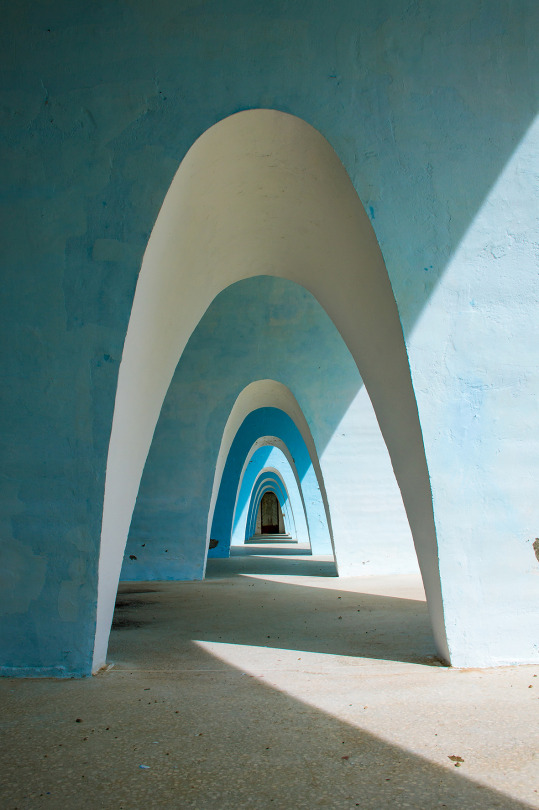
Concrete arches of Magoula Cemetery emanate an aura of Aalto’s wave designs or elements of Niemeyer’s Brasilia | Photo by Exporabilia
Each space comes with an interesting backstory and an evidence of how post-war ambition and civic pride fuses with classical tradition, science, folklore, religion and the natural environment. There is also an evidence of architectural brilliance mired in political persecution, indifference, schadenfreude or a lack of recognition by the establishment. Such storylines are as quintessentially Greek as drama and each might weave their unique pattern into the architecture.
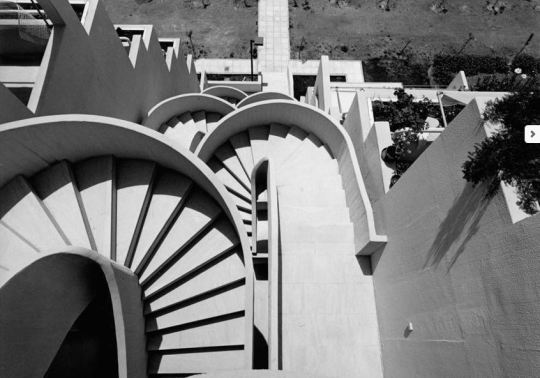
Aspra Spitia is a settlement to house employees of the Aluminum of Greece factory and mining operations west of Athens. | Photo via Fotiadis
Greeks demonstrated an innate affinity for siting and orientation since their temple building days of antiquity. Stillwell (1954) describes a mastery of form, angle, height and orientation: their temples were a planned succession of experiences that culminated into a grand, final approach of the cult image. Temple construction was an early use of architecture and urban planning principles to deliver a coherent visual and emotional result - exempli gratiaa transcendental, religious experience.
youtube
In post-war Greece, architect and urban planner Constantinos Doxiadis drew inspiration from the same fountain of knowledge. He created a seminal worker’s settlement that both transcended the provincial vernacular andchimed in fascinating consonance with its natural surroundings. It is like a place of eternal youth by design like Logan’s Run Caroussel), where residents never get to grow too old.
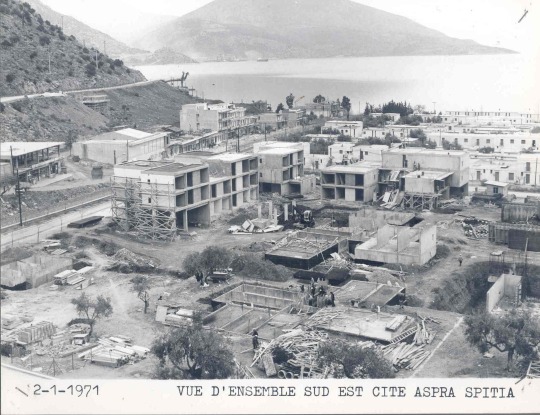
The construction phase on of Aspra Spitia. | Photo via © Doxiadis

Through Ekistics, Doxiadis approached settlements as complex biological organisms. | Photo via Voiotias
Aluminum of Greece was launched in 1960 as a joint venture between the government of Greece and an industrial conglomerate led by the historic French firm Pechiney, a world leader in aluminum manufacturing. As a result, the first aluminum production facility in the country opened on the northern coast of the Corinthian Gulf in 1966. Capitalising on the nearby bauxite ore mines (one of the largest deposits in Europe), the vertically integrated manufacturing process ranged from raw material extraction to the delivery of a range of secondary bauxite and aluminium by-products. It was an ambitious and successful industrial project that created new opportunities for employment for those prepared to settle there. The sheer scale of the industrial unit and its ancillary facilities, however, created an urgent need for housing the employees, prompting the creation of a new settlement nearby. They called it Aspra Spitia (White Houses), and to this day, it remains a model for small scale urban planning with a unique blend of Modernist yet distinctively traditional Greek aura.

Constantinos Doxiadis in 1975
The urban planning, layout and design of the settlement was masterminded by Constantinos Doxiadis and his associates, who also delivered the first phase of the project. Doxiadis, an experienced urban planner who held various Public Works related government posts for the Greek government between 1937 and 1951, was a leading figure in the country’s post-war reconstruction effort. His private practice has been rising in international prominence since it was founded in the early 1950s; by 1959, he was appointed as chief urban planner for the city of Islamabad, Pakistan, while his firm was involved in numerous local and international projects, prompting him to construct a new headquarters in Athens to house their now 400 strong team of urban planners, architects, and engineers.
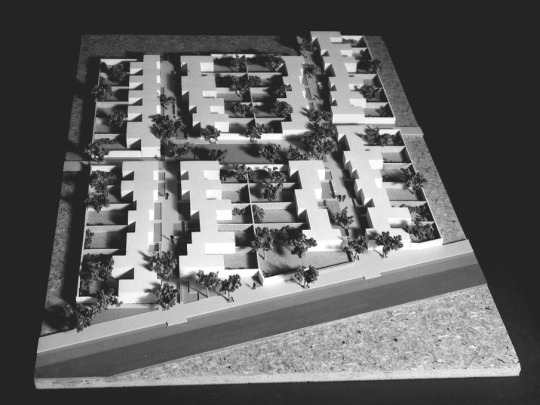
The model for Aspra Spitia. | Photo via © Doxiadis.org
Still, Aspra Spitia was a challenging brief: there was nothing but olive trees and a few vernacular shacks inside the tiny seaside valley. The first wave of French engineers settling at the newfound community were disheartened: this rugged slice of paradise had yet little to show in the way of creature comforts. And there was a looming danger in choosing to deliver a typical, prefab industrial settlement, with identikit housing units built around amenities: that choice of plan was expected to mark the marvellous landscape irreparably, presenting an unsuitable urban continuation of the industrial landscape at the nearby factories and mines. The new resident workers might feel disconnected, transient, and without a sense of belonging to the very habitat they might end up spending their entire career.
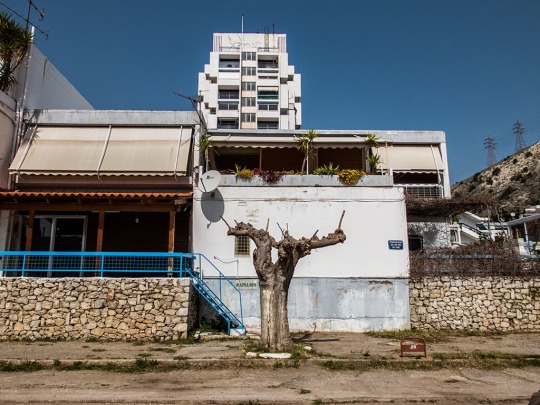

A commercial centre Tower | Photo via © astronayths.blogspot.com
However, Doxiadis had a clear vision about Aspra Spitia. His plan was informed by his Ekistics philosophy, first proposed in 1942 and constantly developed since. Through Ekistics, Doxiadis approached human settlements as complex biological organisms - capable of forming connections with each other, constantly evolving, merging and scaling in orderly harmony with the natural environment. And preserving the purity and beauty of the hills, the seafront, and the olive tree fields within the planning scope of a factory, mines and a worker’s settlement at Aspra Spitia became a key challenge. These very different, both natural and man-made constituent units demanded to be re-shaped into a natural fit. This wouldn’t be about forcing an irreverent, modern smudge in the landscape: it’d be about the foundation of an orderly, organic urban environment.

A corner unit of the Phase 1. | Photo via © astronayths.blogspot.com
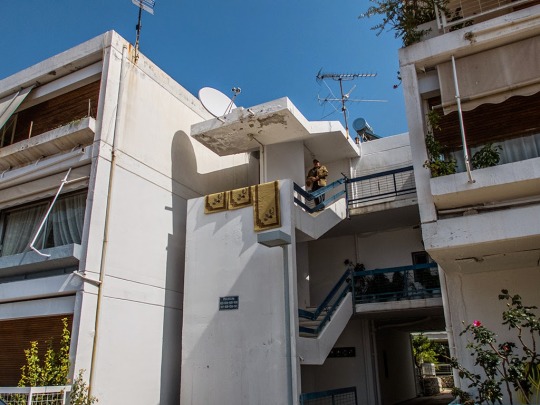
Stairs from the Phase 2. | Photo via © astronayths.blogspot.com

Units from the Phase 2. | Photo via © astronayths.blogspot.com
Thankfully, Doxiadis’ Ekistics already proposed such a scalable hierarchy for ordering urban settlements – an arrangement that social and biological sciences concluded was important for the avoidance of chaos. And at the beginning of the scale, there was Anthropos – the individual. It was expected that the aluminium workers would be mostly recruited from the nearby rural areas. Therefore, understanding the familiar traditions those new settlers were expected to carry with them was a crucial design element, as well as preserving the individuality of each constituent unit: each house, each cluster, each neighbourhood had to feel fresh and special, but still flow with identifiable tradition and heritage, also retaining a degree of deference to the natural environment. And the whole ensemble needed to remain functional for its intended purpose, without reverting to picturesque anachronisms.
All these elements were carefully infused into the inverse L-shaped city plan, which follows the organic contour of the landscape closely: The long leg is flanked by hills, while the short leg is laid across the seafront. Within the resulting space, four neighbourhoods were created, each circled by a peripheral road. The civic, business and administrative forum of the city is located at the junction of the legs, while a recreation and tourism area is laid along the seafront.
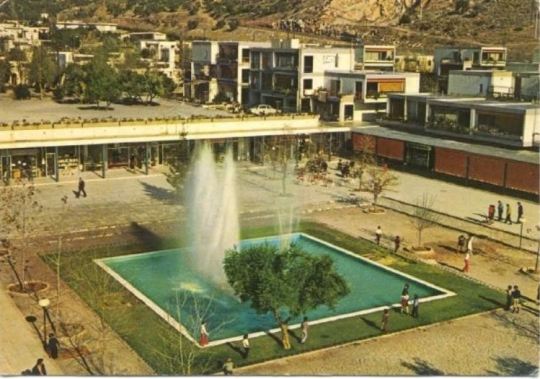
The settlement’s main square.
The design of the residences and public spaces is where it all comes together. Twelve unique house designs were utilized, each standardized with interchangeable elements that enabled the architects to alter the design in intermediate stages of construction. This technique increased the resulting variety of house types to twenty-five, while further variations were achieved by mixing-up the properties of each street in terms of house orientation, elevation, set back, and corner placement. Therefore, each home and each neighborhood look unique, but also retains a thematic familiarity with the whole ensemble of the town.
Both natural and modern materials are utilized, concrete, wood and local stone. The walls and stone are mostly whitewashed, offering a traditional Greek visual clarity to the settlement. Some stone walls remained natural with intent, in cases where these blended visually with the surrounding olive groves. The preservation and integration of existing olive trees in squares, yards and street layouts was prioritised, and supplemented by re-planting as well as new plantings. Stone fences, pergolas, steps and pavements complete the textured landscaping of each neighborhood, while well placed cul-de-sacs, squares and public thoroughfares complete the harmonious balance of private and public spaces.
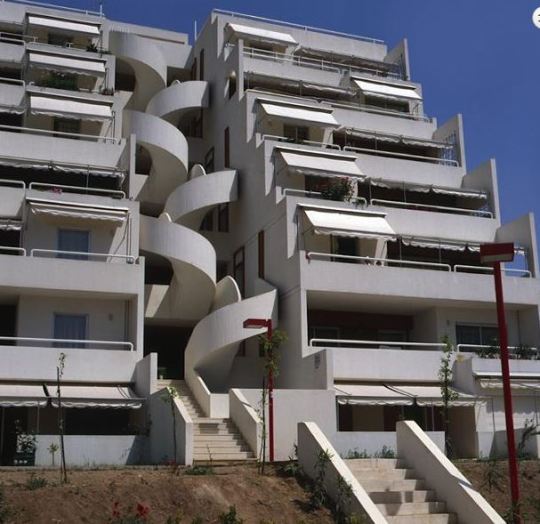
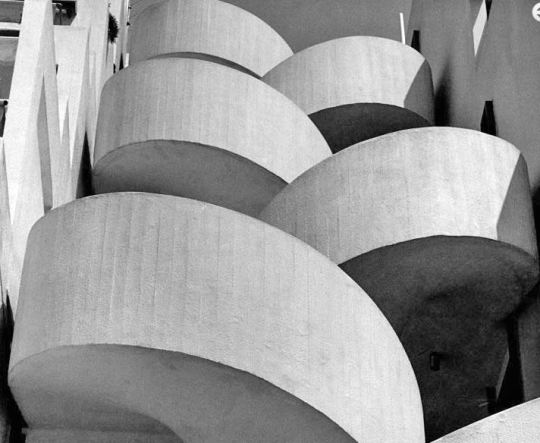
Stairs from the Phase 3. | Photo via © Photiadis.gr
Aspra Spitia was completed in three phases, and now boasts 1072 residences housing approximately 3.000 residents. After the completion of the first houses and amenities by Doxiadis Associates, the city expanded both vertically and aesthetically with additions by C.Lembessis, P.Massouridis and M. Photiadis. A series of high rise, larger apartment blocks as well as specific amenities for the individual needs of the workers and the families were erected. These include a business centre, a nursery, and even a Catholic church for servicing the religious needs of the French settlers. One of the most ground breaking amenities was the installation of a sewage water treatment plant, which was the first of its kind in Greece at the time.

A series of specific amenities for the individual needs of the workers and the families were erected, like the nursery. | Photo via © Photiadis.gr
In terms of administration, Aspra Spitia is not far from the purpose-built, model socialist towns of the former Eastern Block. The settlement belongs to Aluminium of Greece (AL), and working in the mines or factories is a prerequisite for obtaining a house or a flat. A point system exists to help fulfil housing needs accurately, allocating the right type of property per household size. Residents are only required to pay a token monthly rent, while all property maintenance and upkeep is handled by the company. Naturally, these privileges last only for the duration of employment. Workers who wish to move on to another company or reach retirement age aren’t eligible to stay anymore: they are required to vacate their house, after making all necessary alternative arrangements. This is a town where people are not expected to grow old, and the reason why a cemetery was never planned as part of the urban grid (the nearest ones can be found in surrounding villages).
If Ekistics is about approaching urban environments in biological terms, then Aspra Spitia possibly holds the secret for urban immortality: free from the mortal vestiges of permanence and ownership, this is a model town that is, and will remain as fresh and tidy as planned over half a century ago.
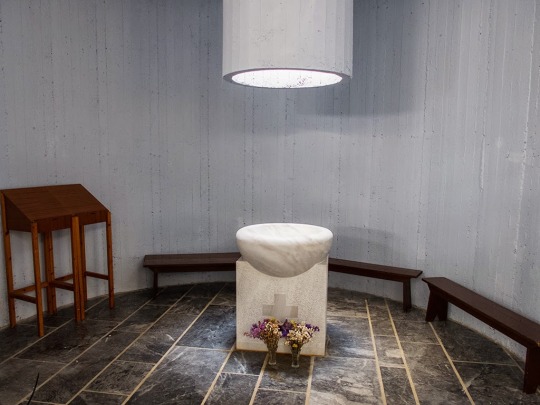
The Church. | Photo via © astronayths.blogspot.com
The next stop is a few miles across the water from Aspra Spitia, where a forgotten Isthmia Prime Motel presents an abstract expression of three Classical disciplines: architecture, mathematics and music.
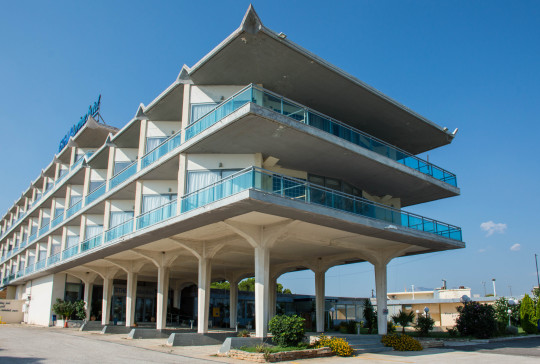

The unassuming roadside motel by the Isthmus of Corinth is an intriguing cross between Brutalism and the Classical Orders. | Photo by © Exporabilia
In its heyday, the main motorway linking the greater metropolitan area of Athens to the city of Corinth in the south west was one of the busiest arteries in Greece's road network. Built between 1960 and 1969, the motorway would hug the craggy cliffs outside the capital with its narrow ledge, offering breath-taking, and somewhat dangerous views of the sea below. Vehicles would naturally slow down at the Isthmus of Corinth, the canal that allowed shipping to navigate the strip of land connecting the Peloponnese to Attica. The slow crossing of the Isthmus Bridge enabled passengers to admire the view of the man-made chasm below, and traditionally led to a quick pit stop on the other side of the canal.
The Isthmus region was becoming a very popular weekend escape with Athenians post war. At about one hour drive from the capital, it was near, yet far enough to enjoy the sea and fresh air. Small villas and seaside hotels sprang out in local villages and hamlets for weekenders to escape the hustle and bustle of a rapidly urbanizing Athens.
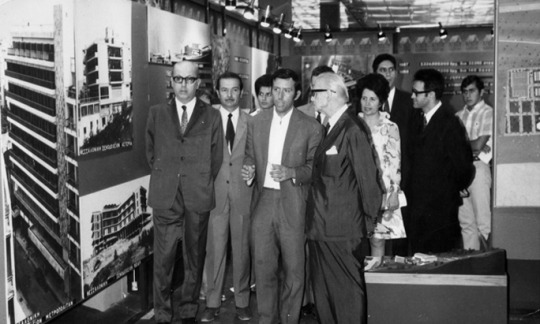

Panos Spiliotakos presenting his work. | Photo via © ema-arch.com
It is at this popular stopover area past the canal, where the strangely alluring hotel was built in 1969 in a collaboration between composer Iannis Xenakis and urban planner Panos Spiliotakos, two visionary friends expressing their common architectural heritage.
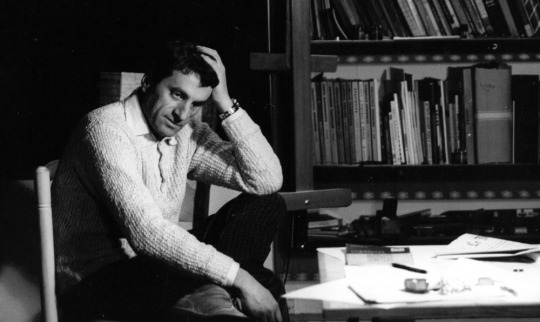
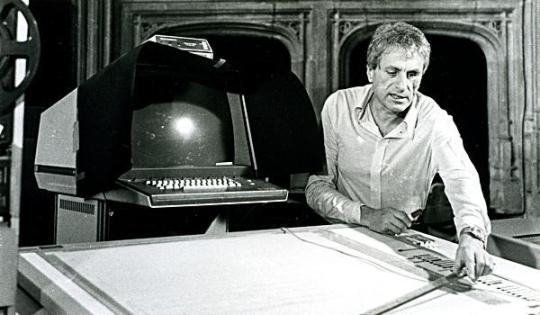
Iannis Xenakis | Photo via © Adelmann Collection of Françoise Xenakis
Xenakis was perhaps the most well-known of the duo. He was a Greek multidisciplinary artist with a passion for music and engineering and an unquestionable aptitude in both. He survived the war suffering a terrible face wound - caused by shrapnel from a shell fired by a British tank into a crowd of Communist protesters demonstrating in the streets of Athens in December 1944. As a qualified engineer, he left for Paris in 1947 where he worked under Le Corbusier at the Unite D'Habitation and Convent De La Tourette.
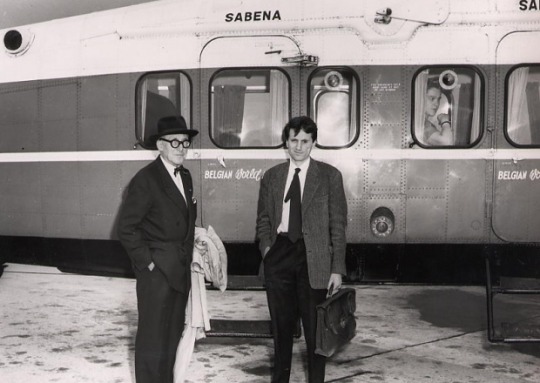
Le Corbusier with Iannis Xenakis. | Photo © Iannis Xenakis
During that period, and through his own musical culture, Xenakis soon realised that the same complex spatial geometrical patterns applied in Le Corbusier's architecture - the structural calculations, the intersecting tones and curves - could be applied to the composition of music too. His seminal 1955 musical work Metastaseis (lit.transmutations) was inspired by Einsteinian ideas about time and space, and utilised the mathematical principles of the Fibonacci sequence and the Golden Section structured around Le Corbusier's architectural calculations. It shocked the world of contemporary music at the time: this was original Brutalist music, with all the sonic cantilevers, rebar and board marking you could handle.
youtube

The Algorithmic Compositions of Metastaseis
Xenakis' knowledge of architecture allowed him to use graphic notation to represent his music. The string glissandi and other musical motions of his piece, representing sonic beams with time on one axis and pitch on another, looked less like sheet music, and more like a blueprint. With Le Corbusier occupied in the construction of Chandigarh in India, Xenakis went on to design the Phillips Pavilion in Brussels Expo 58 on his behalf. It's a unique marriage of music and architecture, with its hyperbolic paraboloid masses deriving from the musical landscape of his own Metastaseis.
Inside the Pavilion, an expansive array of speakers and dials were arranged in an acousmonium: an avant-garde playback device used to spatialize musical scores. The array had been invented in the 1940s by proponents of musique concrète, an experimental circle of composers with whom Xenakis was associated. Further musical scores by Xenakis and Edgard Varese were performed this way throughout the pavilion, creating a unique meta-experience that fused architecture and music like never before.
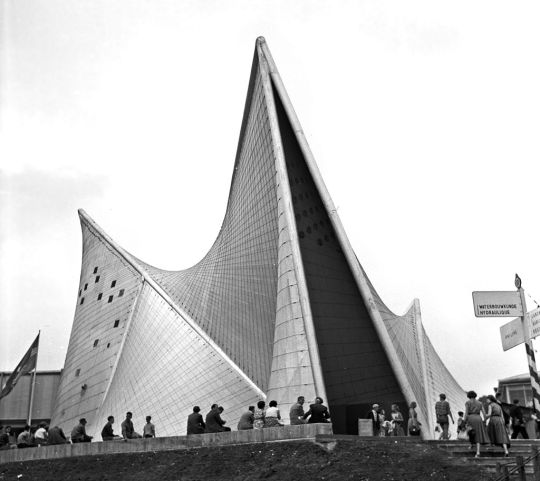
The Phillips Pavilion in Brussels Expo 1958. | Photo © Wouter Hagens
True to the genius of Iannis Xenakis, the building by the Corinthian Isthmus emanates a classical aura throughout. Built as a modern diversorium (a roadside inn), it reflects the long Graeco-Roman resort heritage of the area. The sulphur baths at nearby Thermae (today's Loutraki) attracted visitors since the antiquity. Many classical villas and baths have been discovered in the region through the years. It makes perfect sense that Isthmia Prime's characteristic main entrance colonnade is made of 12 stern, board-marked concrete columns, a Modernist throwback to the Doric order of the nearby Temple of Apollo. The colonnade is supporting the 3-storey main residential block, with the rooms arranged obliquely to the main axis to maximise the beautiful views of the Gulf of Corinth beyond.

The colonnade is supporting the 3-storey main residential block, with the rooms arranged obliquely to the main axis. | Photo by Exporabilia
The triangular concrete antefixeson the flat roof is another wink to the floral anthemiaof antiquity, the decorative palmettes that adorned the eaves of ancient Greek and Roman buildings. The block is intersected by the reception and services area at ground level, allowing for a practical green area at the front with a star shaped pond. Iannis Xenakis reminded us that rhythm, as symmetrical repetition, is the ancient, supernatural bond that links mathematics, music and architecture. Isthmia Prime is an elegant, if somewhat forgotten example of these classical and artistic traditions, fused expertly together with his characteristic elan.
The building at Corinth is a Modernist throwback to certain familiar artistic traditions of Classical antiquity. At the corollary of this Athenian-centric luminary ethos, there’s a counterpart a Spartan-centric ethos, founded on the principle of selfless sacrifice as the pinnacle of civic achievement. Naturally, there’s less opportunity to go down fighting under a hail of arrows in our day. But dedicating one’s life in the service of the state is here presented as a visual metaphor of Sparta’s finest traditions in the Modernist Necropolis of Magoula.

The waveform of the Magoula Cemetery is symbolic of the up's and downs we go through life. | Photo by Exporabilia
The new city of Sparta was founded in 1834 at the behest of Otto, the Bavarian prince who became the first King of Greece in the aftermath of the nation’s successful war of independence. He embarked on a revivalist program that aimed to modernize and urbanize Greek towns. The project was led by Eduard Schaubert,a Prussian architect and topographer who studied under Karl Friedrich Schinkel in Berlin’s Bauakademie. Schaubert also re-designed Athens, Pireaus and other major Greek cities, finely tuning their plethora of Classical and Byzantine sites with the Neoclassical neighborhoods, squares, and administrative buildings that typified the Greek national revival. This is how Sparta, previously obliterated by the Goths in the 4thcentury, was restored by royal decree in 1837. The re-established Sparta became, in fact, the first of the new Greek towns whose design was based on an actual urban plan – thus breaking with the disorderly, vernacular yoke of medieval urban spaces.
A century later, Sparta remained a quaint agricultural town, virtually unchanged since Schaubert planned it. The beautiful neoclassical facades were crumbling, and the street grid had deteriorated and was unsuitable for the ever-increasing motor vehicle traffic. The sewage system was old, and problematic. What’s more, modern Sparta was a city with a distinctive lack of modern facilities and monuments – it was becoming lethargic, almost as if the Goths had somehow travelled forward in time, sacking it again into oblivion.

There are entrances to either end of the arches, one leading to a small functions area, and another to the ossuary. | Photo by Exporabilia
The man who changed all that was Georgios Sainopoulos, the philanthropist who became mayor of Sparta for two terms, over a period of 8 years between 1964 and 1978 (interrupted by the Colonels’ Junta, who ousted him between 1967 and 1974). Sainopoulos dedicated his life to the improvement of urban life in Sparta, delivering numerous projects related to sport and cultural facilities, new road & water network infrastructure, and monumental public art. The 1964 cemetery at the satellite hamlet of Magoula was created at his behest - this was his birthplace, and where he seemed to make an almost personal statement about his intention to take the city out of its enduring quagmire, and into an era of progress. The cemetery, alongside other luminary philanthropic projects, was realised via donations he secured from close relatives Ioannis and Catherine Sainopoulos, Greek emigres based in Oklahoma, USA. He then invited local architects Charilaos and Sophia Polychronopoulos to deliver his vision of a surprising modern necropolis that exceeded conventional expectations.

Windows reflect the bright Peloponnesian sunshine in the colors of the CIAM grid green, red, yellow and blue, creating a kaleidoscope of colours inside the space where the funerary chests are kept. | Photo by Exporabilia
Sainopoulos might have been informed by his own experience of monumental modernism as a visitor during the Olympic games of Helsinki in 1952. It would have been an inspirational showcase of Nordic Modernism, exemplifying Olympic ideals, and much of it can still be admired to this day. The waveform these arches form at Magoula is said to be symbolic of the ups and downs we experience throughout life. There are entrances to either end of the arches: one leading to a small functions area, and another to the ossuary, both decorated with saints and religious figures made out of bent rebar. The windows reflect the bright Peloponnesian sunshine in the colours of the CIAM grid: green, red, yellow and blue, creating a kaleidoscope of colors inside the space where the funerary chests are kept.
Ancient Spartan traditions exemplified order and simplicity in all aspects of life, which often carried into funerary rites. Spartans were buried among the living, in anonymous graves inside the city walls. Only those fallen in battle, or women dying in childbirth were deemed important enough to merit their names on gravestones, typically lined up along busy thoroughfares & promenades – therefore transforming their tombs into public monuments. Further inside the Magoula cemetery proper, it is evident that several graves have been created in deviation to the unremarkable, marble-clad basilica orthodoxy of Greek cemeteries: the scale, shapes and materials are different, and there are statues, busts, carvings and funerary symbols that simultaneously reflect a sense of civic grandeur, and a closer affinity to the Western European funerary canon.
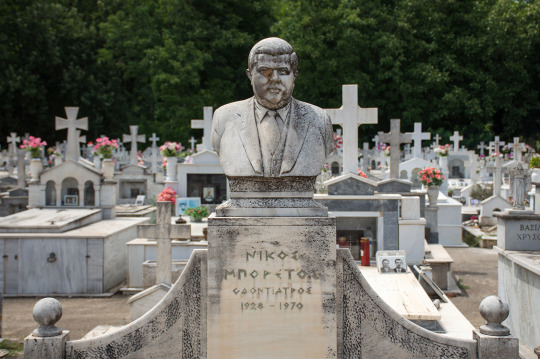
Shapes and materials of graves are different, statues and symbols reflect a closer affinity to European funerary traditions. | Photo by Exporabilia
Leonidas, the famous king who fell in Thermopylae was perhaps the most well-known son of Sparta. It is said that his remains were posthumously transferred to Sparta and deposited at Leonideon, a rectangular tomb close to the agora that can still be seen today. And as opposed to the more modern, extra muros Roman burial traditions, there’s consequence in the way that the tombs of all true citizens become very much a part of the living urban space. But especially the tombs of those who, like Leonidas, contributed significantly more to perpetuate the lore of their communities, become monuments of civic pride, and public remembrance. Uniquely, Sainopoulos' own resting place is a sizeable vault, accessible through a flight of steps near the entrance to the cemetery. It is a feature rarely - if ever - seen in contemporary Greek cemeteries, and underlines the important character of the site’s mastermind. Arguably, this space represents a somewhat obscure link between the principled simplicity of the Spartans and the visual clarity of Modernist architecture. Deciphered in the key of the region’s Spartan heritage, the beautiful ensemble at the cemetery of Magoula is so much more than the average burial site usually seen in Greek towns : it is a poignant memorial showcase of lives well lived in the service of the local community, beautifully conveyed through the avant-garde architectural mind set of the 1960s.

An eclectic, monumental ensemble that fuses Classical, Byzantine and Romantic architectural styles. | Photo © M. Hulot
The civic principles of the Hellenistic world eventually clashed with the tenets of Christianity. In Greece this tectonic collision created new philosophical and artistic planes that inadvertently radiated their common roots, despite the necessities of doctrinal contrasts. Understanding this blend is quintessential to understanding the modern Greek psyche. The temple of Agia Foteini of Mantineia is the ideal visual representation for this melding process.
In the sunlit Arcadian plain close to the ancient city of Mantineia, there’s a church like no other. It’s an astonishing melange of styles, combining elements of Classical, Byzantine and Modern architecture, and yet remaining true to none. Its construction is the life’s work of architect and iconographer Kostas who has delivered an epic display of drama, faith and devotion that has astonished and divided ever since.
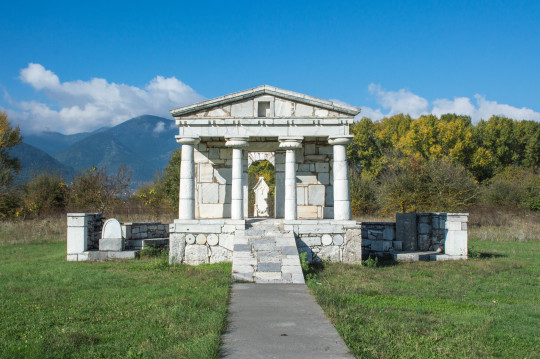
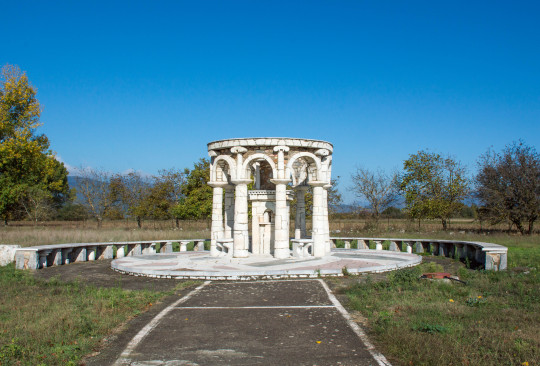
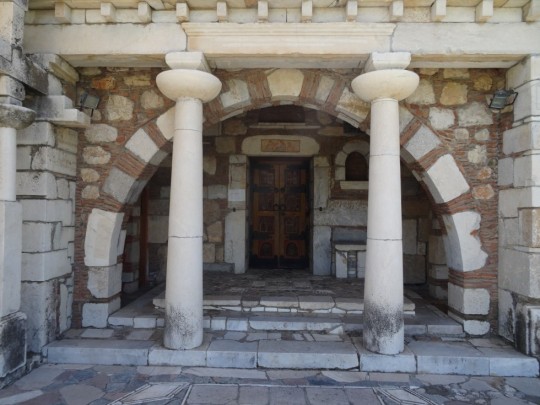
Heroic Tomb, Jacob’s Well and the Church’s Entrance. | Photo © M. Hulot
Papatheodorou was exposed to gothic religious architecture, particularly influenced by Erwin Von Steinbach's work in Strassbourg Cathedral. After his studies he returned to Greece in 1967, where he worked for the Ministry of Culture, studying further under the architect Dimitris Pikionis. During his tenure there, he was exposed to the idea of building a monumental church on behalf of the Mantineian Association, a cultural group dedicated to the preservation of the antiquities of Ancient Mantineia in the southern region of Peloponnese. Bewildered by the beautiful scenery, the majesty of the ancient site, and the character of local customs, he proposed the design of an extraordinary building that captured the region’s quintessence: a visual link among the Classical, Byzantine and Modern traditions of Arcadia.

A mosaic inside the church. | Photo © M. Hulot
He resigned his public service role in 1970 to dedicate himself to the project, which eventually became a lifelong commitment. No formal contract was drawn, funding was scarce, mostly based on charity grants and donations from locals and members of the Mantineian Association. Driven by an almost divine inspiration, Papatheodorou moved on location, living in a tent pitched next to the site. This way, he could absorb the spirit of the locality, and focus on the formative stages of the project unhindered. He was often seen roaming construction sites and recycling centres in nearby towns, gathering reject materials: cornerstones from demolished townhouses, leftover marble slab fragments, or broken clay tiles from old roofs. He worked mostly alone, collecting, measuring, chiselling the materials, shaping and piecing the fragments together into an astonishing monument that soon began taking shape. His only help was unskilled manual labour provided by local farmhands. The Classical and Byzantine parts and techniques merge into one another on the walls and bell towers of the church, creating a visual disruption that expresses the forward motion of history - as one era blends into another, leaving its indelible mark at the seams of history. The church becomes a visual representation of the area’s disparate yet interlinked memories, converging through the aeons to create a homogeneous body of local culture.
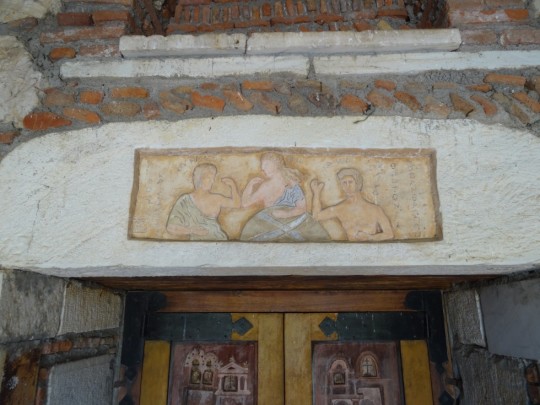
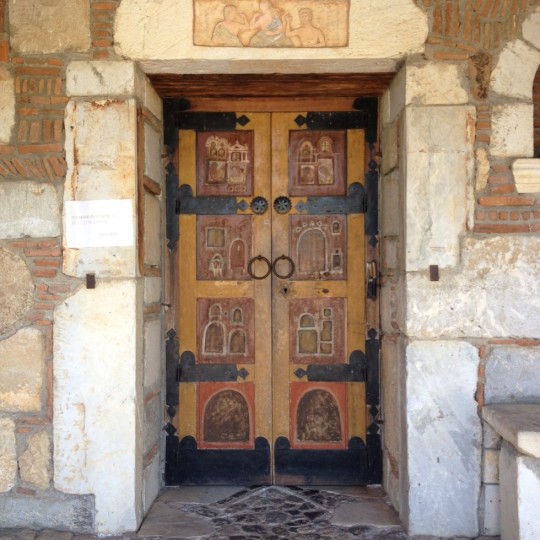
The main entrance. | Photo © M. Hulot
The main structure was completed by 1974, then the interior work began. Inside the church, we see the expression of the architect as an iconographer: The concept of stylistic variety continues, with sequences of religious and pagan themes combining on the mosaics and wall paintings. Classical symbolism such as meanders, pastoral or hunting scenes abound, and figures in ancient togas blend with Christian saints dressed in modern attire, such as jeans and t-shirts. It was too much for a portion of local clergy, who began raising eyebrows: certain offending visuals are then amended to avert the church being characterised as inappropriate for consecration. Conservative circles begin to gossip Papatheodorou, accusing him of irreverence and idolatry. Some others allege that he has unlawfully appropriated materials from the ruined temples and shrines of Ancient Mantineia to incorporate in his church.
But those who recognized and appreciated his work also lend their support – architects, archaeologists and art curators underlines the multidisciplinary reach of his work. The famous Greek painter Yiannis Tsarouchis described the church vividly as fresh water for those in thirst: “When I saw the church, I felt the elation one feels when a justified complaint is suppressed. I’ve heard people characterise Kostas Papatheodorou as an “aping architect”. What I found at the church, however, was a genuine heartbreak, a desperate confession. In our age of fake moralism and ludicrous rationalism, these rare qualities become as important as a vein of fresh water during drought”
The next few years saw the construction of two ancillary buildings, a miniature Classical shrine dedicated to local war heroes, and a fountain with a circular colonnade, representing the biblical fable of Jacob’s Well. The Church is considered work in progress to this day. Some contemporary critics stated that the Church of Agia Foteini of Mantineia is the Greek Sagrada Familia. This may be a somewhat flattering, even inflammatory characterisation for some. There are parallels, however, between the work of Antonio Gaudi and Kostas Papatheodorou as both churches are considered incomplete, both architects deployed their proficiency in a number of related disciplines, incorporating these in their design - ceramics and wrought ironwork for Gaudi, it’s iconography and mosaics for Papatheodorou. Gaudi pioneered the use of trencadís, his famous mosaics made of reject materials, broken tiles, shards of glass, china or shells. Papatheodorou employed a similar technique by fashioning reject materials - such as stones and tiles - as found into walls, towers and mosaics. Last, both architects are inspired by Gothic religious architecture, and they are driven and inspired by their faith, which leads them to wholly devote their lives in their work. Agia Foteini of Mantineia might not have the scale or monumental appeal of the Sagrada Familia. It is however an equally unique spiritual monument, and an important symbol of the historic, cultural and religious ties that bind the people of Arcadia together.
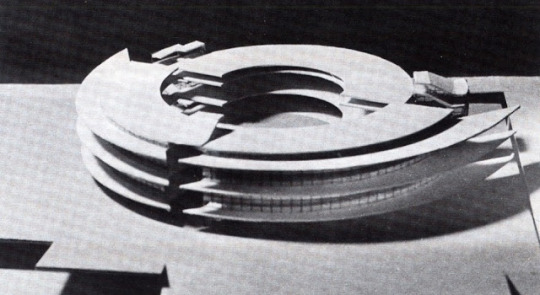
Conceptual Scale Model of the Round School. | Photo © leximata
The resurgent Greek culture of the 19th century was inspired by the glow of its classical heritage, yet emerged fatefully disconnected from it. The impetus with which Greeks used to strive to make sense of what constitutes justice, of what makes an ideal community, or what is good governance - all philosophical questions explored in Plato’s Republic - had become secondary to the medieval moral and civic conventions of the late Byzantine era, and its disastrous outcomes. By the 20th century, a Neo-Hellenic culture has taken hold, characterised by romantic reminiscence, counterproductive self-pity, blind revanchism, and endemic corruption. Inside this purgatory, a vicious circle of astonishing success is always followed by stupefying failure, in an unplanned state of permanent complacency that is always attributed to certain fantastical others. It is a moral decline that Constantine Cavafis alluded to in his poem “Waiting for the Barbarians”, and is without doubt the starting point of the country’s recent string of financial and political failures.
Breaking this craven mould, Takis Zenetos was the Greek modernist architect who demonstrated unbridled optimism and progressive vision through his work. He has a rightful place in my obscure pantheon, another important 20th century personality that epitomized the virtue of living up to one’s own high standards of moral and civic duty.
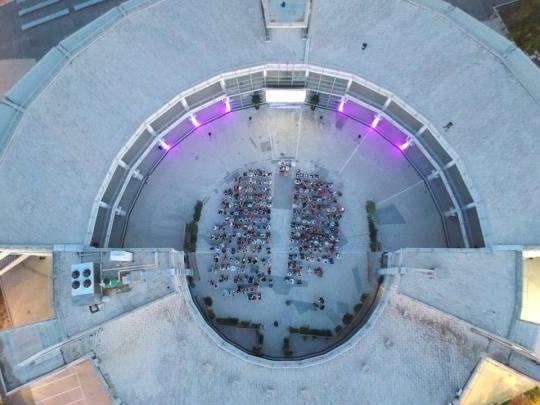
Round School top down view. | Photo © Dimitris Vosios
Agios Dimitrios (often referred to with its pre-1928 name, Brahami) is one of the most densely populated suburbs of Athens with a density comparable to Cairo or Seoul. The typical expedience and maladministration that characterized post-war Greece has left its indelible mark in the suburb’s architecture: its arbitrarily arranged streets define pocket upon pocket of unimaginative apartment blocks that connect to those of surrounding suburbs to form a veritable sea of concrete and tarmac. This is the result of the “flats for land” legislation of 1929, which enabled owners to give up their neoclassical houses in return for a flat or two in the uninspiring concrete tenements and high rises that soon began to blot out the quaint early 20c. suburban landscape. The desperate measure was initially brought in to manage the pressing housing needs of destitute immigrants from Asia Minor in the 1920s and 1930s. The 1.6 million displaced were joining a country of 5 million. This summary convenience was extended to solve later rapid urbanisation problems, such as the Axis occupation and its aftermath. Throughout the 1940s and 1950s, people fled the Civil War and the prospect of a hard life in their devastated villages and sought a better future in the capital, whose extant high density infrastructure had been equally ruined in a month of tenacious urban confrontation between Communist guerrillas and Government forces (the Decembriana of 1944).
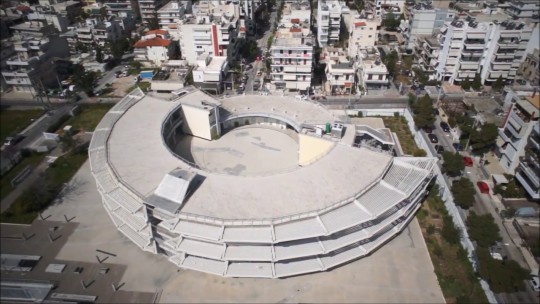
The new architecture principle is educational autonomy, its curves disrupt the sea of high rise blocks that surround it. | Photo © Thomas Andreopoulos
This short term, anarchic character of Greece’s urban planning mentality was deeply troubling for Takis Zenetos. Born and active in Athens for most of his life, he must have witnessed the entire devastating process first-hand: the consequence of conflict in the capital’s urban grid, coupled with the inexcusable sloppiness of the state managing it. The occupation interrupted his studies at the National Technical University (the Metsovion), but in 1945 he moved to Paris to continue at the Ecole Des Beaux Arts under Otello Zavaroni. He was influenced by the order and principles of Modernist architecture in France, before coming back to Athens to practice in 1955. For the next decade, Zenetos designed and built sensational, distinctively Modernist factories, apartment blocks and private villas, always in partnership with his friend Margaritis Apostolidis.
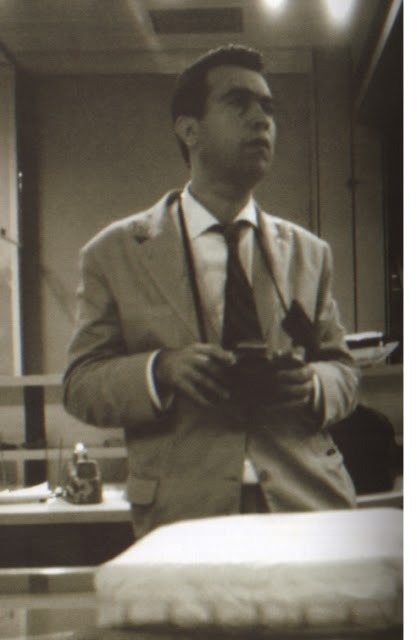
In 1962, Zenetos presented his theoretical concept of Electronic Urbanism founded upon his understanding that science and technology will revolutionize human living. He imagined the new social interaction and communication protocols of the future world; his ideas describe, in principle, what we know today as email, video calling and cloud sharing. His faith in the catalytic influence these would have in our daily lives was well ahead of its time, and informed his architectural designs. His “Furniture 2000”, a multimedia lounge chair for controlling the connected household of the future won a honorable mention in at the Interdesign 2000 competition in 1967.

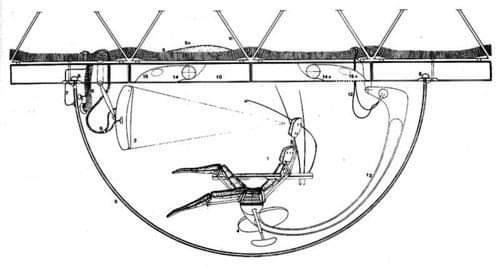
Furniture 2000 | Photo via Tomorrows project
Zenetos envisaged futuristic networked cities, evolving around frameworks of massive, flexible cables. These web-like networks would solve the problem of urban regeneration once and for all, allowing the constituent components of the urban landscape - such as buildings, services, or amenities - to attach and detach, becoming replaceable parts of a whole that would easily adapt to the flow of an evolution driven by technology. At the same time, the natural environment would remain at ground level, unaffected. It would have been a landscape pure from infrastructure, with high-tech cities literally hanging from the skies.

Takis Zenetos The Hanging Hotel (1967). | Photo via Mascontext
We can take a glimpse at this unconventional approach, the capacity to innovate, his desire to disrupt the grim post-war urban architecture of Athens at the Round School of Agios Dimitrios. The Modernist rotunda is perhaps his most ambitious surviving work, and the one that still remains closest to his vision – since many of the private residences and factories he designed have either been demolished by municipal authorities on a whim and without consultation, or significantly altered. The reason the school survives mostly unaltered can be credited to the way Zenetos infused the built structure with his vision.
But there’s also a visual message. A new language emerges in the refined way the Round School’s Modernist curves disrupt the sea of high-rise blocks that surround it. This is an empowering environment of uniqueness and self-determination, and an anti-hierarchical symbolism designed to unclutter the young minds from the institutional architectural cues they are confronted by in educational spaces. It’s a bastion against the inner-city uniformity of Agios Dimitrios, of any Greek town. By raising the bar well above the Ministry of Education’s typology of schoolhouse ergonomics, Zenetos created an outstanding building that facilitates communication with its occupants, and a space that attunes them to the concept of individuality. His message hasn’t been lost to many generations of students, many of whom still reminisce of their journey in learning at the Round School with feelings of immense pride and appreciation.

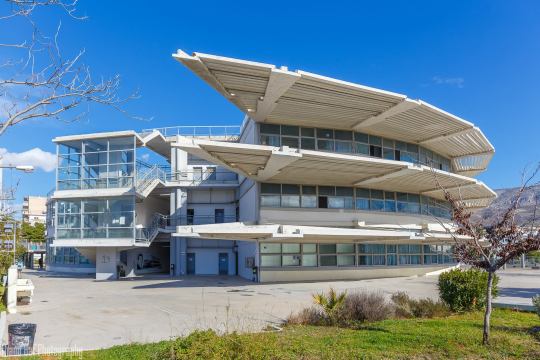
The Round School is a personal statement, a defiant stand against an overwhelming standard of mediocrity. | Photo © Thano Baf
There’s no other Greek school like it, either before, or after this veritable piece de resistance. It is different, inspiring, a beautiful affront to an entire country’s post-war urban architecture manual. It is the product of a vision lost, but not entirely forgotten. Zenetos grew increasingly alienated by the lack of appreciation for his futuristic vision by the establishment. Frustrated by his inability to influence the change he believed in with all his heart, he took his own life in 1977.
—
#FOMA 37: Evan Panagopoulos

Evan Panagopoulos is the urban storyteller behind alternative site Explorabilia. He’s an avid fan of Brutalist and Mid-century architecture, likes engaging with abandoned spaces and obscure history, and expresses what he’s passionate about through writing and photography. His Forgotten Greece tour is available to book on Airbnb and Atlas Obscura.
98 notes
·
View notes
Text
Saturday GC Sessions Summary
Topics, quotes, and summaries of the talks given in the Saturday sessions of the fall 2020 General Conference (with occasional commentary in parenthesis)
*This is (mostly) written from a TBM pov, so I’ve glossed over many... unsavory things. That said, if you’re gonna quote this, definitely proofread it first because I occasionally switch to exmo pov.
Sunday Sessions (long version)
Sunday Sessions (shorter version)
Russel M Nelson
Hopeful, holy bullshit/look at all the spiritually awesome stuff we're doing/gonna do. (idk, there didn't really seem to be much of a talk there)
David A Bednar
Tests in school are as important as the tests of us living on earth.
"Prove, examine, and try."
"If ye are prepared, ye shall not fear."
Susan and I looked over our food storage and learned that we did well in most areas, but found some expired things we were afraid would unleash another global pandemic.
Remember, when loved ones die, and you don't know why, god does. It's a lesson in faith.
Scott D Whiting
How to be more like christ.
Wife and I were in Japan, hiking up a mountain; it was hard because altitude.
One step at a time is how we become more like christ.
Honesty is important, honesty with ourselves.
You can ask others how they view you, but god is a better person to ask, with his perfect view of us.
REPENT! to be the best version of ourselves. Change your heart and mind to be like christ.
Choose one attribute to focus on at a time. Constantly ask god for help, but don't be selfish.
"Be the tide that raises all boats in the harbor."
Recognize that desired attribute in others. Put in a lot of effort.
Caution- don't feel guilty, unworthy, or unloved; that is not what life is about.
You are good enough and loved, but that doesn't mean you're a perfect version of yourself.
Michelle D Craig
Story of Elijah for allegory of struggling to see how god is in your life.
Wait and trust in god. Pray for the lord to open your eyes. Understand how god sees you.
Ask yourself: what am I doing that I should stop and what should I be doing?
Stop looking at your phone. I think it's a good time to multitask, but the spirit told me to stop and the next day, while in line at the grocery store, I looked at the people around me instead. I saw old man and struck up a conversation with him based on what was in his cart (cat food). He said it was his birthday so I wished him a happy birthday. This guy needed me to see him.
A story of a friend who separated from her husband and hoped nobody would talk to her at church. A young woman kept looking back at her and came up to her after sacrament meeting. The young woman told her she loved her and they became friends and it helped her because she felt noticed and cared about.
Ask god to help you see others and act to affirm their lives. This is how we identify our own purpose.
Quentin L Cook
Righteousness. Female followers of brigham young found career opportunites in Utah and friends in the native americans. (Gave a whole bullshit Utah thanksgiving story, complete with rewriting history so white people can feel better about themselves for feeding the natives). There is unity in respect. Historically, we have not been perfect, but that is the goal. We don't need to have all the blessings of god to be righteous. Love god and fellow man to live in eternal peace and happiness with god. "Historical record" in 1 nephi shows there were no happier people because of righteousness. But then that society was destroyed so much that mormon asked how they would avoid punishment. We live in that latter time, not unity. Our challenge is to lift and bless society as a whole. Demonstrated by ethnic harmony and an all inclusive doctrine. Unity and diversity are not opposites. All races and colors are children of god. Laws written in god's chosen land (US) were written by imperfect men, but inspired by god for equal treatment of all men. Remember that we were onced very opressed because we wanted to share jesus' love. If you are not united, you are not god's children. Gosple culture is greater than regional cultures. We honor pioneers because of their struggles.
Ronald A Rasband
Supplying the world with temples is a holy duty.
Sacred ordinaces lead to exaltation.
"Temples rise above the ways of the world. Every temple... stand as testaments to our faith and eternal life and the joy of spending it with our families and heavenly father. They increase understanding of the godhead and the everlasting gospel and commitment to live and teach truth and our willingness to follow the example of jesus."
I learned an important lesson while visiting my father in law as he was dying; that temple recommends are important, even while dying.
The worthiness interview "is not about do's and dont's. It is about finding your worthiness and to testify of your devotion to the gospel teachings."
(I stopped paying attention for a while.)
Hunter said his biggest desire was to have every member hold a temple recommend.
Come get yo rec's! "Whether you have access to a temple or not, it is still important to remain and prove your worthiness."
(I'm really struggling to pay attention to this guy and holy shit he stressed "be patient" while I was typing that.)
Dallin H Oaks
"The lord's teachings are for eternity and for all of god's children."
My examples will be US-centric, but I'm sure that the issues the US face are universal, right?
Destrucitve behavior in political statements are not good.
Remember that JC said to love your enemies. Contention is of the devil, not JC. It isn't easy. Seek and ye shall find the strength to love.
Follow the laws of man.
Nobody can make us angry, it is our choice to be angry.
(Reference to The King and I-) learn about other people's culture.
Don't participate in rioting.
Wait, he's supporting the first ammendement- oh, the stress here is on the word "peaceful". We must do better to end racism. But remember to be peaceful! No violence. Anarchy is evil. Lincoln said "there is no greivance that is a fit object of redress by mob law". It undermines individual rights, not protects.
The US was started by diverse people! We're inherintly diverse! Here's a diverse (british) example!
AFTERNOON SESSION
D Todd Christofferson
There's a 2030 sustainable development agreement thingy. It's got 17 goals including- no poverty, no hunger, quality education, gender equality, clean water and sanitation, and decent work. It is interesting and important.
More important is a sustainable society.
Two biblical examples: 1. The city of enoch. They were of one heart and one mind. 2. The 1st generations of nephites an lamanites. No envies nor strifes. No murders or lying. No happier people than them. Love thy neighbor. Every man seeking the interests of his neighbor. Virtues uphold these societies.
Then they became exceedingly wicked and millions died in wars amongst themselves.
"When people turn from a sense of accountability to god and begin to trust instead in the arm of flesh (?)", disaster lurks.
A good life is more important than a long life.
I'm so fucking blessed, so this really isn't a good topic for me, but here we are.
The light of christ is what uneducated people call a consience.
"When one has no higher god than himself, and seeks no greater good than satisfying his own appetites and preferences, the effects will be manifest in due course. A society, for example, in which individual consent is the only constraint on sexual activity is a society in decay. Adultery, promiscuity, elective abortion and out of wedlock births are but some of the bitter fruit that grow out of the immorality sanctioned by the sexual revolution." This leads to poverty and fatherless families, sometimes in multiple generations, and deficient education and mental destruction.
"Our joyous message is that there is a better way through god... (the core truths of this message are) god lives, he is the heavenly father of our spirits, that as a manifestation of his love, he's given us commandments that lead to a fullnes of joy with him, that JC is the son of god and our redeemer, that he suffered and died to atone for sins on condition of our repentance, that he rose from the dead, bringing to pass the resurrection of human kind, and that we will all stand before him to be judged."
Steven J Lund
My son had cancer. It was hard. He was in lots of pain, but still wanted to go to church even when his mom suggested he stay home. He knew he inspired others when they saw him there, representing the savior by willingly suffering to serve.
All youth programs are there to help them be more like JC.
They are surrounded by things that keep helping them do that, but they're still making mistakes, so parents and leaders need to step up (potterheads grab your wands).
Gerrit W Gong
Family of 10 is hated by neighbors, nobody likes them until their house burns down. Then they were showed kindness, hope, and understanding by their neighbors helping them.
"Our 2020 bicentenniel proclamation begins with the profoundly inclusive promise that god loves his children in every nation of the world. Each of us in every nation... god promises covenants, and invites us to come partake of his abundant joy and goodness. God's love for all people is affirmed throughout scripture that love encompasses the abrahamic covenent, gathering his scattered children, and his plan of happiness. In the house of faith, there are to be no strangers, no foreigners, no rich and poor, no outside others. As fellow citizens with the saints, we're invited to help the world for the better, from inside out; one person, one family, one neighborhood at a time. This happens when we share the gospel."
Church materials are available in many regions and languages. We're gonna focus on that for a while. (And I stopped paying attention again. This dude is boring af. And I have a high threshold for boring right now)
Talking about how members do charity work.
W Christopher Waddell
Some kid said it was the greatest day of his life to meet this guy who talks to the profit a couple of times a week. The story is given with the obvious topic of "we thank thee oh god for a prophet".
Prophets tell us to prepare for crisis.
We understand your struggles and want to express that there are better days ahead. Church leaders can help you.
The lord loves effort.
Have stores of food and money, but don't go to extremes in your efforts to establish those things.
We have a brochure on finances with quotes from people about how god will provide.
Remember Joseph in Egypt.
"All things are spiritual to the lord and not at any time has he given us a law which is temporal."
Manage your finances and have food storage.
Matthew S Holland
The feeling of Alma remembering his sins are as painful as passing a kidney stone (?!).
Repentance will bring us relief.
We have no idea how bad our suffering will be if we don't repent.
"Medical science, professional counseling or legal rectification can help alleviate such suffering but note, all good gifts including these, come from the savior. Regardless [of] the causes of our worst hurt or heartaches, the ultimate source of relief is the same: JC. He alone holds the full power and healing balm to correct every mistake, right every wrong, adjust every imperfection, mend every wound, and deliver every delayed blessing."
When you feel like nobody could understand your suffering, remember that jesus can.
"Suffering in righteousness helps qualify your for, rather than distinguishes you from, god's elect."
William K Jackson
An Indian dude didn't want to turn his back on his culture in order to convert with the rest of his family. But JC was able to open his eyes to a different viewpoint.
Our original culture is the culture of Adam and Enoch. It is the greatest of all cultures. There is no "us v them" mentality in the greatest of all cultures.
"We believe that we are responsible and accountable for ourselves, each other, the church, and our world. Faith in JC is the first principle of our culture, and obedience to his teachings and commandments is the outcome.”
“It is a culture of covenants and ordinances, high moral standards, sacrifice, forgiveness, repentance, and caring for the temple of our bodies. It is a culture of the preisthood, the authority to act in god's name, the power of god to bless his children. It edifies and enables individuals to be better people, leaders, mothers, fathers, and companions- and it sanctifies the home. In the culture of christ, women are elevated to their proper and eternal status. They are not subservient to men, as in many cultures in today's world, but full and equal partners here and in the world to come.”
“The family is the basic unit of eternity. The perfection of the family is worth any sacrifice" because, as has been taught, "no other success can compensate for failure in the home."
This culture is concerned with things of lasting worth.
It is inclusive, not exclusive.
"Because this culture results from the application of our savior's teachings, it helps provide a healing balm of which our world (cue crying) is in such desperate need. What a blessing it is to be a part of this grand and (voice wavering) *noble* way of life. The church is hardly a western society or an american cultural phenomenon. it is an international church, as it was always meant to be. New members from around the world bring richness, diversity, and excitement into our ever-growing family!" (hallelujah!)
Indian dude joined the church, of course.
"What a marvelous heritage (quiet sob) we all share!"
Dieter F Uchtdorf
Because of a threat from the US military, the SLC temple was buried during constrution. When the threat had passed, they excavated it and found that many stones in the foundation had cracked and were replaced. "Finally, the saints could sing How Firm a Foundation and know their holy temple was built on a foundation that would last for generations.”
“This story can teach us how god uses adversity to bring about his purposes." Which is an appropriate topic these days.
We mourn with those who have lost loved ones to covid.
"My message today is that even though this pandemic is not what we wanted or expected, god has prepared his children and his church for this time."
We will do more than survive, we will move forward and we will be better as a result.
We are like seeds that must be buried before they can sprout. "The love of god and blessing of the restored gospel of JC will bring something unimaginable to spring forth."
Hardships strengthen our character.
"What we learn from biblical examples? 1. The righteous are not given a free pass that allows them to avoid the valleys of shadow... 2. Our heavenly father knows that we suffer, and because we are his children, he will not abandon us..."
"Our best days are ahead of us, not behind us. This is why god gives us modern revelation."
(I stopped paying attention during an aviation allegory.)
Stories of new/potential converts going to appointments early because of excitement. "Our missionaries are busier than ever."
WOMEN'S SESSION
Sharon Eubank
Story of a kid rewarded with his favorite pie for doing chores. He was selfish when his sister asked if she and her friend could have some because they didn't earn it, but changed his mind later. This showed that he was willing to change and show kindness to those who didn't deserve it.
"By union of feeling, we obtain power with god."
I don't like this world. It sucks and I want to make it better and sometimes I feel powerless, but I have done lots of soul searching and have three suggestions.
1. Have mercy. Jacob 2:17, but replace the word "substance" with the word "mercy". We need more mercy in our ministering. "If you would have god have mercy on you, have mercy on each other."
2. Make your boat swing. Rowing definition: "swing" is when all are rowing in such perfect unison that not a single action is out of sync. Somehow, individuality is crucial to this; clones couldn't do it. "Differences can be turned to advantage instead of disadvantage." This makes you go fast and they won because of that.
3. Clear away the bad as fast as the good can grow. Jacob 5: good tree is planted in good ground but was corrupted. A servant asks that the tree be given another chance and then the tree grows good fruit. JC is like the owner of the vinyard, and gives us mercy, if we can give it to each other.
"I believe the change we seek in ourselves and in the groups we belong to will come less by activism and more by actively trying every day to understand one another" because we're building zion.
As women, we have broad influence to remove prejudice and build unity. "I offer this invitation: be part of a collective force that changes the world for good." We're supposed to help others. "The women of this church have the potential to change society."
Rebecca M Craven
(I... I can't focus on this woman long enough to piece together what the fuck she's saying. Sorry.)
I think the overall topic is changing yourself to atone/repent.
Cristina B Franco
This year has given us many surprises that have left us broken.
Personal story about getting a piano. One of the delivery guys slipped and broke it. The delivery guys went back to arrange the delivery of a new piano, but her husband asked if it could just be repaired instead. The manager said "the wood is broken, and once the wood is broken, it can never sound the same."
We are like the broken piano, feeling broken and that we'll never be the same again. "However, as we come unto JC by exercising faith in him, repenting, and making and keeping covenants, our brokenness, whatever it's cause, can be healed [by the savior's healing power to make us better than we were.]." Faith in god heals us.
Story of Alma where god promised to ease their burdens.
(Really long quote from Alma that she doesn't source).
The savior is a refuge from the storm.
(Is there a rule that women can't have more than 20% original content in their talks? What is with all the quotes from other people, with barely anything to make them relate to each other?)
THAT'S MY HIGH SCHOOL CHOIR TEACHER DIRECTING THE SEPT 2014 CHOIR!!!
Bonnie H Cordon
JC is the light and the life of the world; the light that shines in the darkness.
Shit's been hard these last few months, but we see you praying and working hard to seek out JC.
Video
Gloomy shit and then "inspiring/soothing" pics of JC, then those same gloomy people are shown being happy while doing normal, everyday stuff. Lots of black people to show diversity and even a deaf woman signing in a video chat on her phone. (It's driving me crazy that i can't remember the song that's playing.) Then back to a pic of JC.
Henry B Eyring
"Every day we are approaching closer to the glorious moment when the savior JC will come to earth again."
"As the beloved daughters of heavenly father, and as the daughters of the lord JC in his kingdom, you will play a crucial part in the grand times ahead."
Prepare to live as the people in the city of enoch did.
Another unsourced quote of "what will happen in this last dispensation of the fulness of times": (was that wording really necessary?) dark skies, earthquakes, etc, but chosen people will be fine. They'll all be gathered into one place (that we could... maybee.... do something to? jk. unless...?).
Women will be at the heart of creating that society.
Quotes about the importance of women and the relief society.
Quotes about how pure and faithful the city of Enoch was.
"My experience has taught me that heavenly father's daughters have a gift to allay contention and to promote righteousness with their love of god and with the love of god they engender in those they serve." (fuck you)
Seeing a household without a preisthood member gave me glimpse of zion because the women were supportive and loving.
Why is it Oaks again?
"In the world, ye shall have tribulation, but be of good cheer, i have overcome the world."
Today, "we are also troubled on every side, and we also need that same message not to despair, but to be of good cheer."
JC knows your wants and fears.
"Be of good cheer."
"Be of good cheer."
"Be of good cheer."
Opposition is essential (anyone know of that musical 'my turn on earth' or am i just old? I've got 'opposition' stuck in my head).
Shit sucks right now. Covid and election shit, the election shit is bad "the most severe many of the oldest of us can ever remember." People are dealing with "the many adversities of mortality: poverty, racism, sickness, job loss, wayward children, bad/no marriages, and the effects of sin" but "be of good cheer." (broken record much?)
Poor JS had lots of adversities! But he still managed to "maintain his native cheery temperament and the love and loyalty of his people." The pioneers had it hard, too, but they still "were of hope and good cheer."
(If I heard this right) The orignal missionaries were sent out for up to 7 years.
The presidency loves you and cares about you and we pray for you (y'all should look up 'ill pray for you' by Jaron Lowenstein, btw. i promise it's hilarious).
"There is boundless power in the doctrine of the restored gospel of JC. Our unshakeable faith in that doctrine guides our steps and gives us joy. It enlightens our minds and gives strength and confidence to our actions. This guidance and enlightenment and power are promised gifts we have recieved from our heavenly father. By understanding and conforming our lives to that doctrine, including the divine gift of repentance, we can be of good cheer as we keep ourselves on the path of eternal destiny, reunion, and exaltation with our loving heavenly parents." (sidenote- I typed that quote really fast with very few mistakes and I'm very proud of myself. I'm sure I've never typed that fast and correctly in my life.)
Russel M Nelson
Shit's been hard and different than normal.
We greive with the women who have experienced loss.
Social media is evil for young women, but "many of you have found ways to encourage others and share our savior's light."
The future gonna be lit, yo.
"If ye are prepared, ye shall not fear."
"Moroni prepared his people in three essential ways:”
“1. He helped them create areas where they would be safe; places of security, he called them.” "Create a home that is a place of security."
“2. He prepared the minds of the people to be faithful unto the lord.” "Each time we have the faith to be obedient to god's laws, even when popular opinions belittle us, or each time we resist entertainment or ideaologies that celebrate covenant breaking, we are exercising our faith, which in turn increases our faith." "Life without god is a life filled with fear. Life with god is a life filled with peace."
“3. He never stopped preparing his people; physically or spiritually." "The adversary never stops attacking, so we can never stop preparing. The more self-reliant we are, temporally, emotionally, and spiritually, the more prepared we are to thwart satan's relentless assualts."
"We have so much to look forward to. The lord placed you here, now, because he knew you had the capacity to negotiate the complexities of the latter part of these latter days. He knew you would grasp the grandeur of his work and be eager to help bring it to pass. I am not saying that the days ahead will be easy, but I promise you that the future will be glorious for those who are prepared, and those who continue to prepare to be instruments in the lord's hands."
"Embrace the future with faith."
#exmo#ex-mormon#apostake#exmormon#mine#ex mormon#exchristian#ex christian#excult#cult stuff#exlds#ex lds#former mormon#ex religious#agnostic#gc october 2020#gc summary
26 notes
·
View notes
Text
Join Us in Prayer and Devotion for the 2025 HJ Cosmic Blessing
United in Devotion: Preparing for the 2025 HJ Cosmic Blessing and Entrance Ceremony
Dear Brothers and Sisters,
As we continue our three key campaigns to offer a victorious offering from America for the Entrance Ceremony of the Cheon Won Gung Cheon Il Sanctum, we are deeply aware of the special devotions our True Mother is making for the success of the 2025 HJ Cosmic Blessing and the Entrance Ceremony.
With America actively attending True Mother, we have been working together in heart and action to welcome newly Blessed couples and witness the historic moment of our Heavenly Parent entering the eternal temple. Your dedication—through witnessing, supporting our young people, and contributing to the Cheon Won Gung—is truly inspiring. Thank you!
As we approach the final stretch, particularly with the upcoming deadline for Blessing registrations, we invite everyone to join in a special period of devotion from now until March 21 for the purpose of supporting our young members to be matched and registered for the blessing in time for this year. Let us focus our prayers on these key points:
Supporting True Mother’s vision for the victorious offering of the 2025 HJ Cosmic Blessing and Entrance Ceremony.
Securing victory for the Blessing initiative, bringing our young couples to Korea for the cosmic blessing.
Ensuring all members participate in the special grace including all couples who can renew or even restore their standing as blessed families without blemish in preparation for the Entrance Ceremony.
Strengthening our unity and commitment as the Elder Son Nation, fulfilling our responsibility to attend and support True Mother, our Holy Mother Han.
Now is the time to offer our utmost sincerity, faith, and devotion. Let us stand together, unwavering in our love and commitment, as we support True Mother in ushering in this new era.
Thank you for your prayers, efforts, and investment in Heaven’s providence.
In gratitude and unity, Rev. Demian Dunkley President
0 notes
Text
Putting on Hairs: Monster Manual
Summary: Short descriptions of the monster types of each girl and the role they play in the theater or in association with it. Warning: This Manual may contain ***SPOILERS*** for characters not yet mentioned or explored or for scenes that have not yet been written, though I will try to keep things limited to what has been revealed.
This chapter also may end up being edited. A lot. This whole thing is a work in progress, so unrevealed or unexplored characters may have their monster types or roles, or both, changed if a better idea presents itself.
----------
Name: Yazawa Nico Race: Weredog Werewolf Role: Star of Putting on Hairs Background: Inspired to be an actress by her father, who wanted her to share her smile with the world. She has been acting pretty much as long as she has been able to talk. She had many lead roles back in high school and college, but was unable to land one upon becoming a professional, despite her popularity with both critics and general audiences. She earned enough to hire an old high school friend, Nozomi, to be her agent. It was Nozomi that found a newly opened theater willing to give Nico her first shot at stardom on the professional stage.
Name: Nishikino Maki Race: Salamander Role: Costar of Putting on Hairs Background: Maki was born into a family of famous and wealthy movie stars. However, she grew up falling in love with live theater, instead of the silver screen. Still, she obeyed her parents' wishes and became a child star in a television series and appeared in many commercials afterward. After college, she manged to persuade her parents to let her try performing in live theater and they made the connections that landed her costar role alongside the rising star, Nico.
Name: SakurauchiRiko Race: Demon, formerly of Amdusias' legion Role: Pianist in the orchestra Background: Fearing facing an eternity of playing the cacophonous music of Hell, Riko fled to Earth in an attempt to find something else. She was quickly drawn to the piano and was able to earn a meager living playing in bars and other small venues. She applied many other places and was eventually accepted at a newly opened theater.
Name: Tsushima Yoshiko Yohane Race: Angel, Fallen Role: Assistant in the costume department Background: Cast out of heaven and cursed, Yoshiko has spent years trying to find her place in the mortal realm. Somehow, she found herself in Tokyo and stumbled into a kind woman, Kotori, who offered to teach her how to weave her own feathers into garments that could be sold at a premium. When Kotori accepted a position at a theater being opened by her childhood friend, Umi, Yoshiko decided to follow and continue her apprenticeship. Name: Toujou Nozomi Race: ??? Role: Nico's agent Background: Nico's closest friend since high school where they were in the same drama club. They moved in together in college and have lived together since. Nozomi majored in business and began her own talent agency with Nico as her first client.
Name: Minami Kotori Race: Crane Role: Head of costume department Background: Childhood friend of Umi and Honoka. Has always had an affinity toward clothing and design. When Umi started working with Dia to open a theater, Kotori jumped at the chance to make outfits for the cast. She is quite skilled at using her own feathers to imbue exceptional qualities in the clothing she creates and is happy to pass this knowledge to Yoshiko, her assistant. She is also capable of using other materials derived from other beings, e.g. Phobetor's fur or Riko's wings. Favors are her preferred currency, particularly those that will benefit the theater.
Name: Sonoda Umi Race: ??? Role: Co-founder and Co-owner of the Sonoda Kurosawa Theater Background: Childhood friend of Kotori and Honoka. Daughter of the renowned Sonoda family who already have a theater in Tokyo. However, as her elder brother stands to inherit the family theater, she has decided to open one of her own in a different district.
Name: Kousaka Honoka Race: ??? Role: Owner of Kousaka Catering Background: Childhood friend of Kotori and Umi. Took over the family catering business when her parents retired. Happily contracts with Umi's theater as often as possible.
Name: Hoshizora Rin Race: ??? (cat something) Role: Delivery girl at Kousaka Catering Background: Childhood friend, now girlfriend of Hanayo. Happily supports her girlfriend's theater obsession, even if she doesn't share it.
Name: Koizumi Hanayo Race: ??? Role: Cast member Background: Childhood friend, now girlfriend of Rin. Obsessed with theater from a young age, Hanayo has always dreamed of becoming an actress. However, she lacks courage. Rin's encouragement and support were the driving force behind her joining the theater club in high school and eventually earning a degree in acting. It was also Rin's connection with Umi through Honoka that led her to be brought on at the new theater.
Name: Ohara Mari Race: ??? Role: Heiress to the Ohara chain of hotels and patron of the theater Background: Childhood friend of Kanan and Dia. Lost track of her best friends when she moved to the United States to finish high school and then Italy for college. Returned to Japan but was only successful in reuniting with Kanan. Both moved to Tokyo when they heard Dia was opening a theater there. She owns a sizable penthouse apartment near the theater where she lives with Kanan. She leaves a room open for Dia, should she ever wish to accept the offer.
Name: Matsuura Kanan Race: Kraken Role: Owner of a dive shop and driver for Mari Background: Childhood friend of Mari and Dia. Lost track of Mari when she moved to the United States to finish high school and Dia when she moved to Tokyo for college. Reunited with Mari upon her return to Japan and agreed to move to Tokyo with her when they heard Dia was opening a theater there. She lives with Mari in a sizable penthouse apartment. As Mari refuses to charge her rent, she contributes to the household in other ways, like driving for Mari.
Name: Kurosawa Dia Race: ??? Role: Co-founder and Co-owner of the Sonoda Kurosawa Theater Background: Childhood friend of Mari and Kanan. Lost track of Mari when she moved to the United States to finish high school. Then she moved to Tokyo for college and lost track of Kanan. She is not entirely sure how Mari and Kanan learned she was opening a theater, but she is grateful for the generous donations made by Mari. She is also grateful Mari has not attempted to use the donations as leverage in her repeated efforts to get Dia to move in with her and Kanan. As for the theater, she has not openly discussed her reasons for moving to Tokyo instead of staying in Numazu where her family was already established in the industry. Upon opening, she extended an offer of employment to her younger sister, Ruby.
Name: Kurosawa Ruby Race: ??? Role: General staff at the theater Background: Younger sister of Dia. Grew up obsessed with acting, though has never had the courage to try becoming an actress herself. She moved to Tokyo when Dia offered her employment at the theater she was opening. Her best friend, Hanamaru, has suggested trying for a few minor roles, but time will tell if she does so.
Name:Kunikida Hanamaru Race: ??? Role: Theater crew Background: Best friend of Ruby who she met in middle school. Raised in a temple with few modern amenities, she has limited experience with technology. However, the temple did host many events over the years, most of which included some sort of theatrical performace. As such, Hanamaru decided to join Ruby in moving to Tokyo and applied for a position in the crew for Dia's theater.
Name: Emma Verde Race: ??? Role: ??? Background: Born and raised in Switzerland, she moved to Japan to learn more about the country's culture by way of its theater production. At least that is what she would say if asked in a public interview. In private, among those she trusts, she would admit she wanted to learn more about the differences of public perception and acceptance of monsters in Japan compared to the rest of the world.
----------
Notes: So, that's what I have at the moment. I'll keep adding details as they come to me.
As mentioned above, I will attempt to keep this chapter spoiler-free. However, as spoilers personally do not bother me, if the interest is there with my readers, I will put everything I have here, not just the details revealed in the story, up to wherever I have managed to write. This probably will result in more edit notifications, as I will undoubtedly change things, right up to the point of it being used in the story. And I'm not opposed to possible retcons if better ideas come later.
Also, many of the ??? entries are due to me not having assigned that monster type or role to that girl, though some I have assigned, but have not yet revealed. I am still working on filling my spreadsheet and bouncing ideas off several fellow authors.
However, I am more than happy to accept suggestions from my readers as well. Feel free to comment over on AO3 or send a suggestion anonymously here, or message me directly here, on twitter or Discord. If I like the idea or your reasoning, I may end up using it, and as always I will do my best to credit the sources of my inspiration.
Also, the idea doesn't necessarily need to be a perfect fit. Koto's is probably the best fit out of all of them; I really don't think I will end up doing better. WoofNic is shamelessly stolen from daily-nicotine. Krakanan was too funny not to use, though I knew she had to be some sort of sea critter. Maki started as an Ifrit and was changed to salamander because I love the idea of her being smaller than Nico. Riko is a demon to be an opposite to Yohane's angel, but I'm also amused by the contrast between Riko's canon traits and those stereotypically assigned to demons.
1 note
·
View note